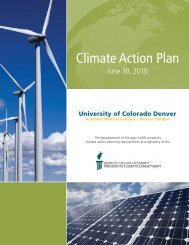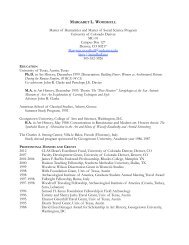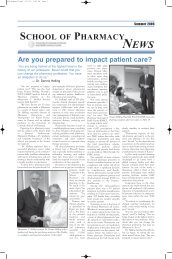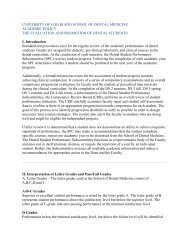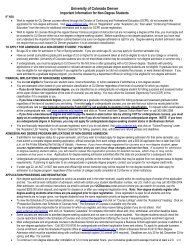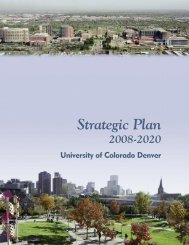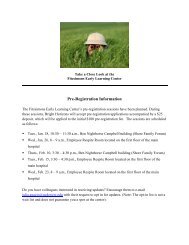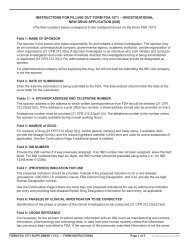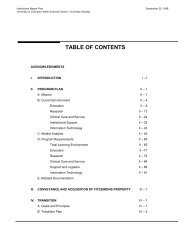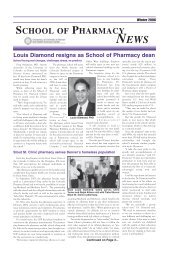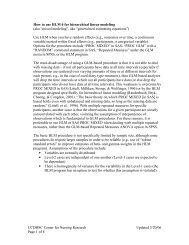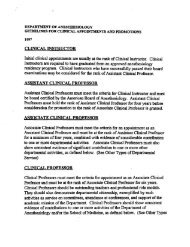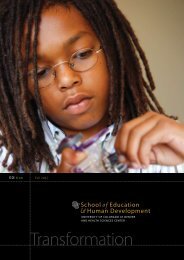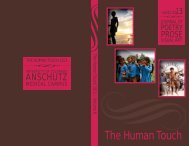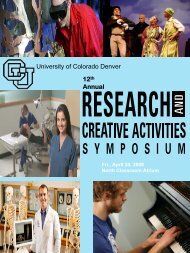final final final course book offerings - University of Colorado Denver
final final final course book offerings - University of Colorado Denver
final final final course book offerings - University of Colorado Denver
You also want an ePaper? Increase the reach of your titles
YUMPU automatically turns print PDFs into web optimized ePapers that Google loves.
ANSCHUTZ MEDICAL CAMPUS GRADUATE SCHOOL<br />
The following <strong>course</strong>s, listed alphabetically by department, have been approved for graduate credit. Please see the<br />
Interdepartmental (IDPT) section for <strong>course</strong>s which are taught cooperatively by individual departments.<br />
BIOCHEMISTRY AND MOLECULAR GENETICS<br />
BMGN 7620 Genomics 2.0+1.0 cr.<br />
Dr. D. Pollock - (Spring) Permission <strong>of</strong> primary instructor.<br />
An introduction to the theory and practice <strong>of</strong> genomics. Topics include sequencing and mapping, overview <strong>of</strong><br />
genomes, transcriptomes, bioinformatics and statistics, population-level variation, ethics, evolutionary genomics,<br />
proteomics, metagenomics, and functional genomics.<br />
BMGN 7650 Research in Biochemistry and Molecular Genetics 1.0-10.0 cr.<br />
Dr. P. Megee - (Fall, Spring, Summer) Prereq: Consent <strong>of</strong> instructor.<br />
Research work in biochemistry and molecular genetics.<br />
BMGN 7660 Biochemistry Seminar 1.0 cr.<br />
Dr. P. Megee – (Fall, Spring)<br />
Seminar series provides a forum for the presentation <strong>of</strong> scientific experiments and information in biochemistry<br />
by faculty, postdoctoral fellows graduate students, and invited outside guest speakers.<br />
BMGN 8990 Doctoral Thesis 1.0-10.0 cr.<br />
Dr. P. Megee – (Spring, Summer, Fall) Prereq: Consent <strong>of</strong> instructor.<br />
Doctoral thesis work in biochemistry and molecular genetics.<br />
BIOMOLECULAR STRUCTURE<br />
BMST 7350 Proteins 3.0 cr.<br />
Dr. R. Hodges – (Spring) Crosslisted: PHSC 7350.<br />
Provide chemical/physical basis for protein structure, folding, function and stability. Presents methods/<br />
principles <strong>of</strong> protein/peptide purification and enzyme catalysis including electron transfer and mutagenesis. The role <strong>of</strong><br />
molecular dynamics and use <strong>of</strong> molecular simulations in the investigations <strong>of</strong> protein-ligand/protein-protein interactions.<br />
BMST 7354 Structural Analysis <strong>of</strong> Biomolecules I 2.0 cr.<br />
Dr. R. Hodges – (Spring) Crosslisted: PHSC 7354.<br />
Describes fundamentals <strong>of</strong> spectroscopic methods used to study protein structure/function. These techniques<br />
include optical methods (CD spectroscopy, fluorescence and absorbance) vibrational methods (IR and EST), analytical<br />
ultracentrifugation, mass spectrometry, calorimetry, light scattering and Biacore analysis. Taught alternate years.<br />
BMST 7454 Structural Analysis <strong>of</strong> Biomolecules II 2.0 cr.<br />
Dr. R. Hodges – (Spring) Crosslisted: PHSC 7454.<br />
Methods and strategies for determination <strong>of</strong> the primary and 3-dimensional structures <strong>of</strong> biologically important<br />
molecules. Crystallography, nuclear magnetic resonance spectroscopy and mass spectrometry will be taught in<br />
structural determination <strong>of</strong> proteins, nucleic acids complex carbohydrates, and lipid molecules.<br />
BMST 7650 Research in Biomolecular Structure 1.0-10.0 cr.<br />
Dr. R. Hodges – (Fall, Spring, Summer) Prereq: Consent <strong>of</strong> instructor.<br />
Research work in Biomolecular Structure.<br />
BMST 7660 Biomolecular Structure Seminar 1.0 cr.<br />
Dr. R. Hodges – (Fall, Spring)<br />
Seminar series provides a forum for the presentation <strong>of</strong> scientific experiments and information in structural<br />
biology by faculty, postdoctoral fellows and graduate students.<br />
BMST 8990 Doctoral Thesis 1.0-10.0 cr.<br />
Dr. R. Hodges – (Fall, Spring, Summer)<br />
Doctoral thesis work in Biomolecular Structure.<br />
CANCER BIOLOGY<br />
CANB 7600 Cancer Biology 3.0 cr.<br />
Dr. S. Nordeen - (Spring) Prereq: IDPT 7811, IDPT 7812, IDPT 7813, IDPT 7814 and IDPT 7815<br />
This <strong>course</strong> integrates the examination <strong>of</strong> cancer at molecular, cellular, tissue and organismal levels. Course<br />
open to all graduate students from any program with an interest in mechanisms and models <strong>of</strong> cancer and will give broad<br />
appreciation for current issues/problems.<br />
CANB 7610 Pathobiology <strong>of</strong> Cancer Mini-Course 1.0 cr.<br />
Dr. R. Low – (Spring) Prereq: IDPT 7811, IDPT 7812, IDPT 7813, IDPT 7814 and IDPT 7815<br />
1
Provide understanding <strong>of</strong> clinical issues associated with human cancer. Contains both didactic and laboratory<br />
components. The latter will focus on pathology <strong>of</strong> human tumors at macroscopic/microscopic levels. Students will gain<br />
understanding <strong>of</strong> cancer diagnosis/epidemiology/treatment through study <strong>of</strong> specific tumor types.<br />
CANB 7613 Research Seminars and Journal Club 1.0 cr.<br />
Dr. R. Evans – (Fall, Spring)<br />
Current research topics in experimental pathology, virology, and tumor biology. Graduate students and faculty<br />
presentations.<br />
CANB 7620 Histophysiology 3.0 cr.<br />
Dr. D. Orlicky - (Spring)<br />
Discussions <strong>of</strong> cell interactions, tissue physiology, and renewal based upon the histologic cell types and<br />
structures present. Where pertinent, pathologic alterations will be introduced to facilitate identification <strong>of</strong> the important<br />
normal functions/structures.<br />
CANB 7650 Research in Cancer Biology 1.0-10.0 cr.<br />
Dr. S. K. Nordeen - (Fall, Spring, Summer) Prereq: Consent <strong>of</strong> instructor.<br />
Research work in cancer biology.<br />
CANB 7680 Hypothesis Development & Experimental Design 2.0 cr.<br />
Dr. A. Thorburn - (Fall, Spring) Prereq: CANB 7600, IDPT 7811, IDPT 7812 ,IDPT 7813, IDPT 7814. Coreq: IDPT 7815<br />
Students will discuss recent research papers and develop new hypotheses that extend the findings in the<br />
papers. Research proposals to test the hypothesis will be written and an oral defense <strong>of</strong> the proposal will be performed.<br />
CANB 8990 Doctoral Thesis 1.0-10.0 cr.<br />
Dr. S. Nordeen - (Fall, Spring, Summer) Prereq: Consent <strong>of</strong> instructor.<br />
Doctoral thesis work in cancer biology.<br />
CANDIDATE FOR DEGREE<br />
CAND 6940 Candidate for Degree 1.0 cr.<br />
F. Osterberg - (Fall, Spring, Summer) Prereq: Consent <strong>of</strong> instructor.<br />
CLINICAL SCIENCE<br />
CLSC 6060 Systems Analysis and Design 3.0 cr.<br />
Dr. J. Karimi - (Fall, Spring, Summer) Crosslisted: ISMG 6040. Offered as a collaborative <strong>of</strong>fering with <strong>Denver</strong> Campus.<br />
Offered as collaborative <strong>of</strong>fering with the <strong>Denver</strong> Campus, emphasizing information requirements analysis,<br />
logical system specification, detailed system design. Topics include structured system development methodologies,<br />
prototyping, file design, systems architecture, systems testing, s<strong>of</strong>tware design strategies. Students use case tool to<br />
develop system specifications.<br />
CLSC 6080 Database Management Systems 3.0 cr.<br />
Dr. W. Zhiping - (Fall, Spring, Summer) Crosslisted: ISMG 6080.<br />
Offered as a collaborative <strong>of</strong>fering with the <strong>Denver</strong> Campus, this <strong>course</strong> focuses on the development and<br />
management <strong>of</strong> database systems to support business operations. Important subjects include semantic data modeling,<br />
normalization, SQL, fourth generation languages, and client-server database applications.<br />
CLSC 6120 Data Communications 3.0 cr.<br />
Dr. S. Walczak – (Fall, Spring, Summer) Crosslisted: ISMG 6120 Prereq: Knowledge <strong>of</strong> computer programming.<br />
Offered as a collaborative <strong>of</strong>fering with the <strong>Denver</strong> Campus. Course introduces the basic concepts <strong>of</strong> data<br />
transmission, principles governing the design and administration <strong>of</strong> both wide and local area networks, and technical<br />
issues pertaining to client server computing and open system interconnection.<br />
CLSC 6210 Research Seminars in Clinical Science 1.0 cr.<br />
Dr. L. Cicutto – (Fall, Spring, Summer)<br />
This <strong>course</strong> provides an overview <strong>of</strong> the types <strong>of</strong> clinical translational studies being conducted by senior CLSC<br />
doctoral students. The interactive seminar series structure allows for interdisciplinary scientific dialogue among students<br />
at various stages <strong>of</strong> training, mentors and faculty.<br />
CLSC 6211 Immersion in Community Engagement 3.0 cr.<br />
Dr. L. Cicutto – (Summer) Restrictions: Students need to contact the CLSC program prior to registering.<br />
This <strong>course</strong> focuses on community-based participatory research, community engagement and understanding<br />
health disparities through a community immersion experience.<br />
CLSC 6251 Assistive Technology: Advanced Practices in AT Assessment 3.0 cr.<br />
Dr. C. Bodine - (Fall, Spring, Summer)<br />
Students will learn to use family-centered, trans-disciplinary methods <strong>of</strong> assistive technology assessment for<br />
individuals with low-incidence disabilities. Observations, videotaped learning activities, and supervised assessment<br />
sessions will facilitate understanding <strong>of</strong> best practice in this field.<br />
2
CLSC 6260 Conducting Clinical Trials for Investigators 2.0 cr.<br />
Dr. Y. Kellar-Guenther - (Summer)<br />
Course is for investigators conducting clinical trials. Course covers good clinical practices/regulations<br />
that surround setting up and running clinical trials. Clinical studies and popular press articles highlighting what can go<br />
wrong in clinical trials will be reviewed and discussed.<br />
CLSC 6261 Assistive Technology: Implementation for Low Incidence Disabilities 3.0 cr.<br />
Dr. C. Bodine - (Fall, Spring, Summer)<br />
This <strong>course</strong> provides an overview <strong>of</strong> low incidence populations (including intellectual, hearing, and vision<br />
impairments), relevant research, and implementation strategies in early childhood and classroom settings. Emphasis is on<br />
implementation techniques, and working with trans-disciplinary teams, supporting agencies, and families.<br />
CLSC 6270 Clinical Appraisal Seminars in Clinical Science 1.0 cr.<br />
Dr. L. Cicutto - (Fall)<br />
This <strong>course</strong> provides an overview <strong>of</strong> the approaches for critically appraising common study designs published in<br />
the clinical and translational sciences literature, as well as other sources <strong>of</strong> information.<br />
CLSC 6271 Assistive Technology: Advanced Fieldwork Experience in AT 2.0 cr.<br />
Dr. C. Bodine - (Fall, Spring, Summer)<br />
Students participate in fieldwork experiences <strong>of</strong>fering individually-tailored opportunities to engage in AT<br />
assessments, implementation <strong>of</strong> AT in various settings, family-centered Individual Educational Planning meetings, reportwriting,<br />
outcomes-measurement, data-collection, practice, research-based methodologies. Peer-reviewed submission<br />
must be coordinated before grade assigned for <strong>course</strong>.<br />
CLSC 6281 Assistive Technology: Engineering and Biotechnology: 3.0 cr.<br />
Principles & Emerging Technologies<br />
Dr. C. Bodine - (Fall)<br />
Course brings together engineers, AT students in other health-care related areas. The students develop an<br />
understanding <strong>of</strong> engineering principles, technical design process, emerging technologies relevant to assistive technology<br />
in the context <strong>of</strong> support for children with low-incidence disabilities.<br />
CLSC 6300 Scientific Grant Review Process: GCRC Proposals 1.0 cr.<br />
Dr. R. Eckel - (Fall, Spring) Prereq: BIOS 6601, BIOS 6602 (or BIOS 6611-BIOS 6612) & CLSC 7500.<br />
Intended for second year students. Students will understand and participate in the process <strong>of</strong> scientific review<br />
<strong>of</strong> human subject research protocols submitted to the <strong>University</strong> <strong>of</strong> <strong>Colorado</strong> Anschutz Medical Campus GCRCs (both<br />
Adult and Pediatric GCRCs).<br />
CLSC 6550 Applications <strong>of</strong> Biostatistics to Clinical Research Questions 1.0 cr.<br />
Dr. L. Cicutto - (Fall, Spring)<br />
Introduction to allow clinician-scientists to be critical consumers <strong>of</strong> medical literature by improving their ability to<br />
discuss statistical issues about their own research and research <strong>of</strong> others. Familiarity will be gained with commonly used<br />
statistical methods and statistical terms.<br />
CLSC 6608 Statistics for the Basic Sciences – CLSC Supplement 1.0 cr.<br />
Dr. L. Cicutto - (Spring) Co-requisites: CLSC 6606 (BIOS 6606) Course Restrictions: Enrollment in CLSC graduate<br />
program or permission <strong>of</strong> the instructor.<br />
This <strong>course</strong> provides an overview <strong>of</strong> epidemiology, logistic regression, and survival analysis, techniques that<br />
apply to many areas <strong>of</strong> clinical research.<br />
CLSC 6650 Guided Research Tutorial – General 1.0-3.0 cr.<br />
Dr. L. Cicutto - (Fall, Spring, Summer).<br />
Students perform research projects during rotations under the direction <strong>of</strong> a mentor. Required <strong>of</strong> graduate<br />
students in the Clinical Sciences program.<br />
CLSC 6653 Key Concepts in Neurodevelopmental Disabilities I 2.0 cr.<br />
Dr. L. Cicutto - (Spring, Fall) Prereq: A degree in health care pr<strong>of</strong>ession or related field or instructor consent.<br />
Course represents part one <strong>of</strong> two-part interdisciplinary <strong>course</strong> series focused on systems, options for<br />
diagnosis/assessment and alternatives for service provision related to children/youth/young adults with<br />
neurodevelopmental and related disabilities and their families to address this population’s special health care needs.<br />
CLSC 6654 Key Concepts in Neurodevelopmental Disabilities II 2.0 cr.<br />
Dr. L. Cicutto - (Spring, Summer, Fall) Prereq: A degree in health care pr<strong>of</strong>ession or related field or instructor consent,<br />
and completion <strong>of</strong> CLSC 6653.<br />
This <strong>course</strong> represents part two <strong>of</strong> a two-part interdisciplinary <strong>course</strong> series focused on service provision,<br />
intervention strategies and service provision related to children/youth/young adults with neurodevelopmental and related<br />
disabilities and their families to address this population’s special health care needs.<br />
CLSC 6657 Cultural Factors in Healthcare 1.0 cr.<br />
Dr. S. Manson- (Fall, Spring, Summer) Prereq: A degree in health care pr<strong>of</strong>ession or related field or instructor consent.<br />
3
Online <strong>course</strong> will introduce the subject <strong>of</strong> cultural/social determinants <strong>of</strong> maternal and child health in the<br />
present society, including worldviews on health perspectives (wellness versus illness), and address the impact <strong>of</strong><br />
emerging demographic changes on systems <strong>of</strong> care.<br />
CLSC 6658 Interdisc. Approach to Promoting Early Parent Child Relationships-Part 1 Theory 2.0 cr.<br />
Dr. C. Robinson - (Fall) Prereq: A degree in health care pr<strong>of</strong>ession or related field or instructor consent.<br />
Part one <strong>of</strong> a two-part <strong>course</strong> series that will examine the theory and research relevant to the assessment <strong>of</strong><br />
early parent-child relationships as well as the clinical application for interventions across disciplines that are intended to<br />
promote/improve child health outcomes.<br />
CLSC 6659 Interdisciplinary Approach to Promoting Early Parent Child Relationships – 3.0 cr.<br />
Part II: Measurement<br />
Dr. C. Robinson - (Spring) Prereq: A degree in health care pr<strong>of</strong>ession or related field or instructor consent. Completion <strong>of</strong><br />
CLSC 6658.<br />
Part two <strong>of</strong> a two-part <strong>course</strong> that will examine research relevant to assessment <strong>of</strong> early parent/child<br />
relationships, identify intervention strategies by analyzing observational findings, as well as evaluate effectiveness <strong>of</strong><br />
interventions across disciplines intended to promote/improve child health outcomes.<br />
CLSC 6661 Leadership Dialogues I 2 .0 cr.<br />
Dr. K. Kennedy - (Fall) Prereq: A degree in health care pr<strong>of</strong>ession or related field or instructor consent.<br />
This interdisciplinary leadership <strong>course</strong> focuses on leadership strategies needed for providing family-centered,<br />
culturally competent, community-based services for children with special needs and their families.<br />
CLSC 6662 Leadership Dialogues II 2 .0 cr.<br />
Dr. K. Kennedy - (Fall, Spring) Prereq: A degree in health care pr<strong>of</strong>ession or related field or instructor consent.<br />
CLSC 6661.<br />
This interdisciplinary leadership <strong>course</strong> focuses becoming change agents to better provide family-centered,<br />
culturally competent, community-based services for children with special needs and their families.<br />
CLSC 6663 Evidence-based Interventions for Youth with Autism and Other 3.0 cr.<br />
Neurodevelopmental Disorders<br />
Dr. S. Hepburn - (Fall, Spring, Summer) Prereq: Degree in health care pr<strong>of</strong>ession or related field or consent <strong>of</strong> instructor.<br />
This interdisciplinary <strong>course</strong> reviews evidence-based practices in intervention for children with autism and other<br />
neurodevelopmental disorders, presented through lectures, critical readings <strong>of</strong> the literature, case discussions and case<br />
presentations.<br />
CLSC 6664 Leadership Dialogues III 1.0 cr.<br />
Dr. C. Robinson - (Fall) Prereq: Degree in health care pr<strong>of</strong>ession or related field or consent <strong>of</strong> instructor.<br />
This interdisciplinary leadership <strong>course</strong> focuses on leadership strategies needed for providing family-centered,<br />
culturally competent, community-based services for children with special needs and their families. (Nursing only)<br />
CLSC 6665 Leadership Dialogues IV 1.0 cr.<br />
Dr. C. Robinson - (Spring) Prereq: Degree in health care pr<strong>of</strong>ession or related field or consent <strong>of</strong> instructor and<br />
CLSC6664.<br />
Leadership Dialogues IV builds upon skills addressed in Leadership Dialogues III with the addition <strong>of</strong> content<br />
that integrates critical and systems thinking and ethical decision making with the leadership and team concepts and skills<br />
developed in LD III. (Nursing only)<br />
CLSC 6666 Transdisciplinary Model <strong>of</strong> Early Intervention Service Delivery 3.0 cr.<br />
Dr. C. Robinson - (Fall, Spring, Summer). Prereq: Degree in health care pr<strong>of</strong>ession or related field or consent <strong>of</strong><br />
instructor. Course Restrictions: Course participants accepted by <strong>course</strong> instructor approval only.<br />
This <strong>course</strong> provides instruction about the ENRICH model <strong>of</strong> community-based, family-driven, trans-disciplinary<br />
service delivery and will target service coordination/collaboration throughout Part C supports and services, best practice<br />
implementation <strong>of</strong> intervention strategies, and techniques for transferring out <strong>of</strong> Part C.<br />
CLSC 6668 Screening/Assessment for Children/Youth with Autism & Neurodevelopmental 3.0 cr.<br />
Disabilities<br />
Dr. S. Hepburn - (Fall, Spring, Summer).<br />
This interdisciplinary <strong>course</strong> presents best practices in screening/assessment for autism, focusing on:<br />
identification <strong>of</strong> symptoms <strong>of</strong> autism; differentiation <strong>of</strong> autism from other disorders; recognition <strong>of</strong> symptoms; examination<br />
<strong>of</strong> culture on clinical presentation; and approaches to share observations.<br />
CLSC 6699 Masters Research Project: Publishable Paper 1.0-6.0 cr.<br />
Dr. L. Cicutto - (Fall, Spring, Summer). Prereq: Consent <strong>of</strong> program BIOS 6601 and 6602 OR BIOS 6611 and BIOS 6612,<br />
CLSC 7150, EPID 6630.<br />
During <strong>course</strong> students working with his/her research mentor and research project committee to plan, execute,<br />
write Final Research Project in form <strong>of</strong> a publishable paper. In addition, students prepare for Final Research Project<br />
Examination. This is a capstone <strong>course</strong>.<br />
CLSC 6800 Introduction to Health Information Technology 3.0 cr.<br />
Dr. L Cicutto - (Spring)<br />
4
Course intended as overview to the dynamic environment <strong>of</strong> healthcare informatics. Goal <strong>of</strong> <strong>course</strong> is to<br />
prepare healthcare pr<strong>of</strong>essionals to better utilize/manage the emerging communication technologies. A brief introduction<br />
to e-health, telehealth, electronic medical records, telecommunications, and bio-informatics is provided.<br />
CLSC 6820 Fundamentals <strong>of</strong> Health Information Technology Management 3.0 cr.<br />
Dr. H. Haugen - (Fall). Crosslisted: HLTH 6072.<br />
This <strong>course</strong> will provide an introduction to management <strong>of</strong> information technology in healthcare. A description<br />
<strong>of</strong> information processing, the origin, content and evolution <strong>of</strong> healthcare information systems and the methodologies<br />
deployed to acquire and manage information requirements will be discussed.<br />
CLSC 6830 Practicum in Developmental Disabilities 1.0-4.0 cr.<br />
Dr. C. Robinson - (Spring, Summer, Fall) Prereq: Consent <strong>of</strong> instructor.<br />
Practicum in developmental disabilities individually designed to give students and post-graduates observational<br />
experiences in clinical, teaching, or research service settings and systems for persons with developmental disabilities <strong>of</strong><br />
all ages.<br />
CLSC 6831 Practicum in Developmental Disabilities II 3.0 cr.<br />
Dr. C. Robinson - (Spring) Prereq: Instructor consent and CLSC 6830.<br />
Practicum in developmental disabilities individually designed to give students and post graduates hands-on<br />
experiences in clinical, teaching, or research service settings and systems for persons with developmental disabilities <strong>of</strong><br />
all ages.<br />
CLSC 6950 Masters Research Project: Thesis 1.0-6.0 cr.<br />
Dr. L. Cicutto - (Fall, Spring, Summer) Prereq: Consent <strong>of</strong> program, BIOS 6601, BIOS 6602, CLSC 7150, EPID 6630.<br />
During this <strong>course</strong> students plan, execute and write the Final Research Project in the form <strong>of</strong> a Masters thesis.<br />
In addition, students will prepare for the Final Research Project Examination. This is a capstone <strong>course</strong>.<br />
CLSC 7101 Grant Writing I 1.0 cr.<br />
Dr. M. Taylor/ Dr. L. Cicutto- (Spring) Prereq: BIOS 6601 and EPID 6630. Restrictions: CLSC students unless written<br />
approval <strong>of</strong> Course Director<br />
The purpose <strong>of</strong> this <strong>course</strong> is to develop and improve your skills in writing successful grant applications and<br />
participating in the critique and review process <strong>of</strong> grants.<br />
CLSC 7102 Grant Writing II 1.0 cr.<br />
Dr. L. Cicutto – (Spring) Prereq: BIOS 6601, EPID 6630, CLSC 7101. Restrictions: CLSC students, unless written<br />
approval <strong>of</strong> Course Director.<br />
The purpose <strong>of</strong> this <strong>course</strong> is to develop and improve your skills in writing successful grant applications and<br />
participating in the critique and review process <strong>of</strong> grants.<br />
CLSC 7150 Ethics and Regulation in Human Subjects Review 1.0 cr.<br />
Dr. A. Prochazka - (Fall, Spring, Summer) Crosslisted: PHSC 7339<br />
Course provides overview <strong>of</strong> the field <strong>of</strong> ethics in clinical research. Students will learn historical background,<br />
current regulations, IRB requirements related to human subjects protection issues. This <strong>course</strong> requires attendance at<br />
IRB sessions for CLSC PhD and Certificate students enrolled.<br />
CLSC 7151 Lectures in Ethics and Regulation in Human Subjects Review 1.0 cr.<br />
Dr. A. Prochazka - (Fall, Spring, Summer)<br />
Course will provide overview <strong>of</strong> the field <strong>of</strong> ethics in clinical research. It is designed for non-Clinical Science<br />
degree students, certificate students, investigators who will be conducting research involving human subjects. Topics<br />
include historical background, current regulations, and IRB requirements.<br />
CLSC 7200 Clinical Outcomes Assessment 2.0 cr.<br />
Dr. L. Cicutto - (Fall, Spring, Summer).<br />
Course provides overview <strong>of</strong> field <strong>of</strong> clinical outcomes assessment, prepares student to identify patient risk<br />
factors which may influence outcomes, to select outcomes appropriate to use in situation based on critical appraisal <strong>of</strong><br />
literature in context <strong>of</strong> research project’s goals/objectives.<br />
CLSC 7300 Scientific Grant Review Process: Doctoral 1.0 cr.<br />
Dr. R. Eckel - (Fall, Spring) Prereq: BIOS 6601, BIOS 6602, (or BIOS 6611- 6612).<br />
Students will understand and participate in the process <strong>of</strong> scientific review <strong>of</strong> human subject research protocols<br />
submitted to the <strong>University</strong> <strong>of</strong> <strong>Colorado</strong> <strong>Denver</strong> Clinical Translational Research Centers at <strong>University</strong> Hospital and The<br />
Children’s Hospital.<br />
CLSC 7500 Practical Application <strong>of</strong> Molecular and Cell Biology Techniques for the Clinical 3.0 cr.<br />
Investigator<br />
Dr. J. Tentler and Dr. A. Bradford – (Summer)<br />
Designed to teach clinical investigators basic molecular and cellular biology techniques. Format will be handson<br />
with lectures designed to illustrate significance and clinical application <strong>of</strong> techniques. Weekly special topics lectures<br />
will cover cutting-edge technologies and their application.<br />
CLSC 7650 Guided Research Tutorial – Doctoral 1.0-3.0 cr.<br />
5
Dr. L. Cicutto - (Fall, Spring, Summer) Prereq: Consent <strong>of</strong> program, approved <strong>course</strong> plan. This <strong>course</strong> is closed<br />
registration.<br />
This is an independent study <strong>course</strong> developed by student and appropriate faculty member based on the area<br />
<strong>of</strong> study. Students meet regularly with selected <strong>course</strong> instructor. Student and <strong>course</strong> instructor will develop <strong>course</strong> plan<br />
prior to registration <strong>of</strong> the <strong>course</strong>.<br />
CLSC 7890 Research in Clinical Science for Doctoral Students 1.0-6.0 cr.<br />
Dr. L. Cicutto - (Fall, Spring, Summer)<br />
The performance <strong>of</strong> research activities in clinical science having direct relevance to the completion <strong>of</strong> the <strong>final</strong><br />
research project required for the graduate degree in Clinical Science where student is working under mentor’s guidance<br />
and direction.<br />
CLSC 8990 Doctoral Thesis 1.0-10.0 cr.<br />
Dr. L. Cicutto - (Fall, Spring, Summer) Prerequisite: Program consent. BIOS 6601 or BIOS 6611, BIOS 6602 OR BIOS<br />
6680 and HSMP 6617, CLSC 7150, EPID 6630, BIOS 6648 or EPID 6626 or HSMP 6670. Restrictions: Only CLSC PhD<br />
students or collaborative CLSC and CSPH Health Services Research Students.<br />
This <strong>course</strong> involves the student working with his/her research mentor and research project committee<br />
develop, design and execute a clinical science doctoral study as well as to write up the project as a thesis.<br />
COMPUTATIONAL BIOSCIENCE<br />
CPBS 7605 Ethics in Bioinformatics 1.0 cr.<br />
Dr. L. Hunter (Fall, Spring) Offered every other year.<br />
Discussions <strong>of</strong> pr<strong>of</strong>essional conduct, social implications <strong>of</strong> research and questions raised by biomedical<br />
research, with an emphasis on topics relevant to computational biologists. Active student participation is required.<br />
CPBS 7606 Statistics for the Basic Sciences 3.0 cr.<br />
Dr. D. Everett (Fall, Spring) Cross-listed: BIOS 6606.<br />
This <strong>course</strong> provides an overview <strong>of</strong> fundamental concepts in statistics such as hypothesis testing and<br />
estimation and it provides an overview <strong>of</strong> statistical methods (for example, regression and analysis <strong>of</strong> variance) that apply<br />
to many areas <strong>of</strong> science.<br />
CPBS 7620 Genomics 2.0+1.0 cr.<br />
Dr. D. Pollock (Spring) Prereq: Permission <strong>of</strong> Primary Instructor<br />
An introduction to the theory and practice <strong>of</strong> genomics. Topics include sequencing and mapping, overview <strong>of</strong><br />
genomes, transcriptomes, bioinformatics and statistics, population-level variation, ethics, evolutionary genomics,<br />
epigenomics, proteomics, metagenomics and function genomics.<br />
CPBS 7650 Research in Computational Bioscience 1.0 cr.<br />
Dr. L. Hunter (Fall, Spring, Summer) Prereq: Consent <strong>of</strong> Instructor<br />
Research work in Computational Bioscience.<br />
CPBS 7655 Statistical Methods in Genetic Association Studies 3.0 cr.<br />
Dr. T. Fingerlin (Fall) Cross-listed: BIOS 6655. Prereq: BIOS 6612 or permission <strong>of</strong> instructor.<br />
This <strong>course</strong> is designed to give an introduction to statistical methods in genetic association studies. Topics<br />
include an introduction to population genetics topics relevant to genetic association studies, design strategies and<br />
analysis methods for case-control and family data.<br />
CPBS 7659 Statistical Methods in Genomics 2.0 cr.<br />
Dr. K. Kechris (Fall) Prereq: BIOS 6611 or equivalent graduate level statistics <strong>course</strong> with consent <strong>of</strong> instructor. Crosslisted<br />
Course: BIOS 6659 (sponsoring department) / BIOS 7659<br />
This <strong>course</strong> will give an introduction to statistical methods for analyzing molecular sequences and genomic data.<br />
Topics include hidden Markov models for sequence alignment, molecular evolution and gene expression data analysis.<br />
CPBS 7660 Analysis <strong>of</strong> High-Throughput Data 2.0 cr.<br />
Dr. T. Phang (Fall) Prereq: BIOS 6611 or equivalent. Cross-listed: BIOS 6660 (sponsoring Department)<br />
This <strong>course</strong> provides students with hands on experience in analyzing full-scale microarray data using the<br />
statistical s<strong>of</strong>tware, R, and its packages from the Bioconductor consortium.<br />
CPBS 7711 Methods and Tools in Biomedical Informatics 4.0 cr.<br />
Dr. L. Hunter (Fall) Prereq: Permission <strong>of</strong> instructor. Crosslisted: PHCL 7611 (non-sponsor).<br />
An introduction to the theory and practice <strong>of</strong> bioinformatics and computational biology. Topics include: the<br />
analysis <strong>of</strong> macromolecular sequences, structures, gene expression arrays, proteomics, and management <strong>of</strong> the<br />
biological literature.<br />
CPBS 7712 Research Methods in Biomedical Informatics 4.0 cr.<br />
Dr. L. Hunter (Spring) Prereq: Permission <strong>of</strong> Instructor Crosslisted: PHCL 7612 (non-sponsor)<br />
The CPBS faculty members will present lectures on the research currently being conducted in their laboratories.<br />
Students will plan, execute and report on their own research project. This <strong>course</strong> is beginning transition from welleducated<br />
students to independent researchers.<br />
6
CPBS 7785 Independent Study in Computational Bioscience 1-3 cr.<br />
Dr. L. Hunter (Spring, Summer, Fall) Prereq: Permission <strong>of</strong> Instructor.<br />
This <strong>course</strong> is listed for the benefit <strong>of</strong> the advanced student who desires to pursue one or more topics in<br />
considerable depth. Supervision by a full-time faculty member is necessary.<br />
CPBS 7791 Readings in Computational Bioscience 1.0 cr.<br />
Dr. L. Hunter (Spring, Summer, Fall) Prereq: Permission <strong>of</strong> instructor.<br />
A seminar style <strong>course</strong> in which students read and present recent publications from the primary computational<br />
bioscience literature.<br />
CPBS 7792 Special Topics in Computational Bioscience 1-3 cr.<br />
Dr. L. Hunter (Spring, Summer, Fall) Prereq: Permission <strong>of</strong> Instructor.<br />
Topic varies by semester. Designed to give students a chance to evaluate critically some practical or<br />
theoretical problem under faculty supervision and to present results <strong>of</strong> their thinking to fellow students and instructors for<br />
critical evaluation.<br />
CPBS 8990 Doctoral Thesis 1-10 cr.<br />
Dr. L. Hunter (Spring, Summer, Fall) Prereq: Permission <strong>of</strong> instructor.<br />
Doctoral thesis work in Computational Bioscience.<br />
CELL BIOLOGY, STEM CELLS & DEVELOPMENT<br />
CSDV 7605 Stem Cells and Development: an Integrated Approach 4.0 cr.<br />
Dr. D. Clouthier – (Spring) Prereq: IDPT 7811, IDPT 7812, IDPT 7813, IDPT 7814 and IDPT 7815<br />
Integrative introductory <strong>course</strong>, incorporating related fields <strong>of</strong> Cell Biology/Developmental Biology/Stem<br />
Cells/Regenerative Medicine. Through lectures, discussions <strong>of</strong> current literature, student presentations; enrollees will<br />
gain a sophisticated understanding <strong>of</strong> basic cell biological concepts/experimental approaches underlying our current<br />
understanding <strong>of</strong> developmental/stem cell biology<br />
CSDV 7650 Research: CSDV 1-5 cr.<br />
Dr. L. Barlow – (Fall, Spring, Summer) Prereq: Consent <strong>of</strong> Instructor<br />
Research work in Cell Biology, Stem Cells and Development.<br />
CSDV 7670 Advanced Topics: CSDV 1.0 cr.<br />
Dr. L Barlow – (Fall, Spring) Prereq: IDPT 7811, IDPT 7812, IDPT 7813, IDPT 7814 and IDPT 7815<br />
Topics covered in <strong>course</strong> vary from year to year. First topic <strong>of</strong>fering: “Cell Signaling and its regulation in cancer”<br />
by Drs. Reyland and Schedin. Second topic <strong>of</strong>fering is “Neural stem cells in development and disease” by Drs. Artinger &<br />
Barlow.<br />
CSDV 7850 Independent Study: CSDV 1-5 cr.<br />
Dr. L. Barlow – (Fall, Spring, Summer) Prereq: IDPT 7811, IDPT 7812, IDPT 7813, IDPT 7814 and IDPT 7815, CSDV<br />
7605<br />
Independent Study is to allow students to take pr<strong>of</strong>essional school <strong>course</strong> for credit or to gain a defined<br />
expertise with faculty mentor other than thesis advisor. Consent <strong>of</strong> faculty member <strong>of</strong>fering the independent study and<br />
Program Director required.<br />
CSDV 8990 Doctoral Thesis 1-10 cr.<br />
Dr. L. Barlow – (Fall, Spring, Summer) Prereq: Consent <strong>of</strong> the instructor<br />
Doctoral Thesis work in Cell Biology, Stem Cells and Development.<br />
GENETIC COUNSELING<br />
GENC 6101 Psychosocial Aspects <strong>of</strong> Genetic Counseling I 2.0 cr.<br />
C. Walton, M.S. – (Fall) Coreqs: GENC 6105, GENC 6110. Course Restrictions: Matriculated student in Genetic<br />
Counseling M.S. Program<br />
This is the first <strong>course</strong> in a two-semester sequence addressing basic psychosocial and counseling theories,<br />
approaches, and resources necessary for the provision <strong>of</strong> genetic counseling to clients and their families in prenatal,<br />
pediatric and adult clinical settings.<br />
GENC 6102 Psychosocial Aspects <strong>of</strong> Genetic Counseling II 2 cr.<br />
C. Walton, M.S. – (Spring) Prereq: GENC 6101 Coreqs: GENC 6105, GENC 6110. Course Restrictions: Matriculated<br />
student in Genetic Counseling M.S. Program<br />
This is the second <strong>course</strong> in a two-semester sequence addressing basic psychosocial and counseling theories,<br />
approaches, and resources necessary for the provision <strong>of</strong> genetic counseling to clients and their families in prenatal,<br />
pediatric and adult clinical settings.<br />
GENC 6105 Basic Interviewing Skills 1.0 cr.<br />
C. Walton, M.S. – (Fall) Coreqs: GENC 6101, GENC 6110. Course Restrictions: Matriculation as genetic counseling<br />
M.S. student.<br />
7
This <strong>course</strong> covers fundamental theories and principles <strong>of</strong> effective patient/client interviewing in genetic<br />
counseling practice. Lectures are combined with hands-on role plays and interviews so that students may gain applied<br />
experience and receive feedback to foster skills development throughout <strong>course</strong>.<br />
GENC 6110 Topics in Medical Genetics I 3.0 cr.<br />
C. Walton, M.S. – (Fall) Course Restrictions: Matriculated student in Genetic Counseling M.S. Program.<br />
First <strong>course</strong> in a two-<strong>course</strong> sequence regarding principles <strong>of</strong> clinical genetics and genetic counseling, and<br />
development <strong>of</strong> clinical skills used in various medical genetics settings. Fall semester focuses on principles important in<br />
pediatric and general genetics settings.<br />
GENC 6111 Topics in Medical Genetics II 2.0 cr.<br />
C. Walton, M.S. – (Spring) Prereq: GENC 6110. Course Restrictions: Matriculated student in Genetic Counseling M.S.<br />
Program<br />
Second <strong>course</strong> in two-<strong>course</strong> sequence regarding principles <strong>of</strong> clinical genetics and genetic counseling used in<br />
various medical genetics settings, and development <strong>of</strong> clinical skills. Spring semester focuses on prenatal and adult<br />
genetics clinic settings.<br />
GENC 6120 Clinical Cytogenetics and Molecular Genetics 3.0 cr.<br />
C. Walton, M.S. – (Fall) Coreq: GENC 6121 Laboratory in Clinical Cytogenetics & Molecular Genetics. Course<br />
Restrictions: Matriculation into M.S. Genetic Counseling Program or Permission <strong>of</strong> Instructors.<br />
This <strong>course</strong> provides integrated instruction regarding human cytogenetic and molecular genetic principles,<br />
techniques, and diagnostic testing approaches used in clinical evaluation and risk assessment for genetic<br />
disorders/predispositions in prenatal and postnatal patient populations.<br />
GENC 6121 Laboratory in Clinical Cytogenetics and Molecular Genetics 2.0 cr.<br />
C. Walton, M.S. – (Fall) Coreq: GENC 6120 Clinical Cytogenetics & Molecular Genetics. Course Restrictions:<br />
Matriculation into M.S. Genetic Counseling program or Permission <strong>of</strong> Instructors.<br />
Course provides introduction to specific methodologies and interpretation <strong>of</strong> studies used in diagnostic<br />
cytogenetics and molecular genetics laboratories. Principles discussed in the co-requisite clinical cytogenetics and<br />
molecular genetics <strong>course</strong> will be applied through demonstrations, hands-on experiments, discussion <strong>of</strong> illustrative cases.<br />
GENC 6122 Seminar in Clinical Cytogenetics and Molecular Genetics 1.0 cr.<br />
C. Walton, M.S. – (Spring) Prereq: GENC 6120, GENC 6121. Course Restrictions: Matriculation into M.S. Genetic<br />
counseling Program or Permission <strong>of</strong> Instructors.<br />
Course requires students to apply theories/principles <strong>of</strong> cytogenetics and molecular genetics to analysis <strong>of</strong><br />
cases that present in daily operations <strong>of</strong> diagnostic laboratories and formal critique <strong>of</strong> current research literature.<br />
Additionally, students present formal seminar integrating cytogenetic/ molecular genetic principles.<br />
GENC 6130 Cancer Genetics and Genetic Counseling 2.0 cr.<br />
C. Walton, M.S. – (Spring) Prereq: GENC 6110, GENC 6120. Course Restrictions: Matriculation in MS Genetic<br />
Counseling Program.<br />
Course in providing genetic counseling services to clients with or at risk for hereditary cancer predisposition.<br />
Topics include clinical oncology, epidemiology, molecular biology <strong>of</strong> cancer, risk assessment, genetic testing, ethical/legal<br />
issues, clinical research considerations, psychosocial impact/support, specific genetic counseling approaches.<br />
GENC 6140 Human Inborn Errors <strong>of</strong> Metabolism 2.0 cr.<br />
C. Walton, M.S. – (Spring) Course Restrictions: Matriculated student in Genetic Counseling M.S. Program or instructor<br />
permission.<br />
Course provides systematic review <strong>of</strong> major metabolic disorders, including their clinical phenotypes, diagnosis,<br />
and management. Physiological and laboratory testing principles important to understanding these disorders will be<br />
reviewed. Psychosocial impact <strong>of</strong> metabolic disorders and genetic counseling approaches will be discussed.<br />
GENC 6150 Congenital Malformations and Disorders <strong>of</strong> the Newborn 1.0 cr.<br />
C. Walton, M.S. – (Spring) Prereq: GENC 6110. Coreq: GENC 6111. Course Restrictions: Matriculated student in Genetic<br />
Counseling M.S. Program or instructor permission.<br />
This survey <strong>course</strong> covers common major malformations and non-metabolic genetic disorders identified by<br />
newborn screening programs. Clinical phenotypes, diagnosis, management and etiology are addressed. Psychosocial<br />
impact <strong>of</strong> these conditions and genetic counseling approaches will be discussed.<br />
GENC 6201 Advanced Psychosocial Genetic Counseling 2.0 cr.<br />
C. Walton, M.S. – (Fall) Prereq: GENC 6101 and GENC 6102. Course Restrictions: Matriculated second year student in<br />
Genetic Counseling M.S. Program<br />
This <strong>course</strong> examines advanced genetic counseling techniques as they relate to psychosocial theories, specific<br />
client characteristics and the client/counselor dynamic. Critical discussion <strong>of</strong> core topics and readings and case analysis<br />
will be used for instruction.<br />
GENC 6210 Pr<strong>of</strong>essional Issues in Genetic Counseling I 2.0 cr.<br />
C. Walton, M.S. – (Fall) Prereq: GENC 6101, GENC 6105, GENC 6110. Course Restrictions: Second year student in<br />
Genetic Counseling M.S. Program..<br />
First <strong>course</strong> in a two <strong>course</strong> sequence regarding pr<strong>of</strong>essional practice issues <strong>of</strong> master’s level genetic<br />
counselors. The fall semester <strong>course</strong> focuses on pr<strong>of</strong>essional standards, pr<strong>of</strong>essional ethics, legal principles and health<br />
systems and policy issues relevant to genetic counselors.<br />
8
GENC 6211 Pr<strong>of</strong>essional Issues in Genetic Counseling II 2.0 cr.<br />
C. Walton, M.S. – (Spring) Prereq: GENC 6210. Course Restrictions: Second year student in Genetic Counseling M.S.<br />
Program.<br />
Second <strong>course</strong> in a two <strong>course</strong> sequence regarding pr<strong>of</strong>essional practice issues <strong>of</strong> master’s level genetic<br />
counselors. The Spring semester <strong>course</strong> focuses on disability issues, cultural competency, public health genetics,<br />
research methods in genetic counseling, and pr<strong>of</strong>essional roles.<br />
GENC 6250 Risk Calculation in Genetic Counseling 1.0 cr.<br />
C. Walton, M.S. – (Fall) Prereq: GENC 6110. GENC 6120. Course Restrictions: Matriculation in M.S. Genetic<br />
Counseling Program.<br />
This <strong>course</strong> covers pedigree analysis and risk calculation principles used by genetic counselors in clinical<br />
practice.<br />
GENC 6910 Applied General Genetics Clinic 3.0 cr.<br />
C. Walton, M.S. – (Fall, Spring, Summer) Prereq: GENC 6101. GENC 6105, GENC 6110. Course Restrictions:<br />
Matriculation as M.S. Genetic Counseling Student.<br />
This is a clinical rotation for Genetic Counseling M.S. students through a general genetics clinic serving a<br />
variety <strong>of</strong> referral indications. Students will learn and practice case management, history taking, risk assessment,<br />
counseling, and client advocacy skills.<br />
GENC 6911 Applied Prenatal Genetics Clinic 3.0 cr.<br />
C. Walton, M.S. – (Fall, Spring, Summer) Prereq: GENC 6101, GENC 6105, GENC 6110. Course Restrictions:<br />
Matriculation as M.S. Genetic Counseling Student.<br />
This is a clinical rotation for genetic counseling students through a prenatal diagnosis and genetics clinic.<br />
Students will learn/practice history taking, risk assessment, patient education and genetic counseling, case management,<br />
as well as observe prenatal diagnosis and ART procedures.<br />
GENC 6912 Applied Metabolic Genetics Clinic 3.0 cr.<br />
C. Walton, M.S. – (Fall, Spring, Summer) Prereq: GENC 6101, GENC 6105, GENC 6110. Course Restrictions:<br />
Matriculation as M.S. Genetic Counseling Student.<br />
This is a clinical rotation for genetic counseling students through a genetics clinic for inborn errors <strong>of</strong><br />
metabolism. Students will work with patients referred for diagnostic evaluation, medical/nutritional management <strong>of</strong><br />
specific conditions, follow-up <strong>of</strong> positive newborn metabolic screening results.<br />
GENC 6913 Applied Regional & Specialties Genetics Clinics 1.0-2.0 cr.<br />
C. Walton, M.S. – (Fall, Spring, Summer) Prereq: GENC 6101, GENC 6105, GENC 6110. Course Restrictions:<br />
Matriculation as M.S. Genetic Counseling Student.<br />
This is a clinical rotation for genetic counseling students through regional outreach genetics clinics and<br />
specialty/multidisciplinary clinics serving patients with various genetic conditions.<br />
GENC 6914 Applied Hereditary Cancer Clinic 1.0 cr.<br />
C. Walton, M.S. – (Fall, Spring, Summer) Prereq: GENC 6110, PEDS 6601, PEDS 6602. Course Restrictions:<br />
Matriculation as M.S. Genetic Counseling Student.<br />
This is a clinical rotation for genetic counseling students through a hereditary cancer clinic for individuals<br />
seeking genetic counseling and testing for genetic cancer predisposition syndromes.<br />
GENC 6915 Applied Adult Medical Genetics Clinic 1.0 cr.<br />
C. Walton, M.S. – (Fall, Spring, Summer) Prereq: GENC 6101, GENC 6105, GENC 6110. Course Restrictions:<br />
Matriculation as M.S. Genetic Counseling Student.<br />
This is a clinical rotation for genetic counseling students through a medical genetics clinic and clinical research<br />
settings providing diagnosis, management, risk assessment and genetic counseling for adults.<br />
GENC 6919 Applied Medical Genetics Clinic – Clinical Elective 1.0-3.0 cr.<br />
C. Walton, M.S. – (Fall, Spring, Summer) Prereq: GENC 6101, GENC 6105, GENC 6110. Course Restrictions:<br />
Matriculation as M.S. Genetic Counseling Student.<br />
This is an elective clinical rotation for genetic counseling students desiring to arrange training in settings outside<br />
<strong>of</strong> core required clinical rotations or an additional, advanced rotation.<br />
GENC 6920 Applied Medical Genetics – Laboratory Genetic Counseling Elective 1.0 cr.<br />
C. Walton, M.S. – (Fall, Spring, Summer) Prereq: GENC 6120, GENC 6121, GENC 6122. Course Restrictions:<br />
Matriculated student in GENC program who has completed required prerequisite <strong>course</strong>s listed; Permission <strong>of</strong> instructor..<br />
This is an elective clinical rotation for genetic counseling students desiring to arrange training in settings outside<br />
<strong>of</strong> core required clinical rotations or an additional, advanced rotation.<br />
GENC 6940 Capstone Genetic Counseling 1.0-2.0 cr.<br />
Dr. K. Swisshelm. – (Fall, Spring, Summer) Prereq: GENC 6120, GENC 6121, GENC 6122. Course Restrictions:<br />
Matriculated student in GENC program who has completed at least two semesters <strong>of</strong> required <strong>course</strong>work; Permission <strong>of</strong><br />
instructor.<br />
Students will develop a proposal and complete an individualized scholarly project that contributes to the<br />
knowledge and/or practice <strong>of</strong> genetic counseling.<br />
9
GENC 6950 Masters Thesis 1.0-6.0 cr.<br />
C. Walton, M.S. – (Fall, Spring, Summer). Course Restrictions: Matriculated student in Genetic Counseling M.S. Program<br />
Masters thesis research to be arranged with prior approval <strong>of</strong> the Graduate Program in Genetic Counseling.<br />
HUMAN MEDICAL GENETIC<br />
HMGP 7600 Survey <strong>of</strong> Human Genetics 3.0 cr.<br />
Dr. R. Spritz - (Spring)<br />
Survey <strong>of</strong> human genetics, including Mendelian and other types <strong>of</strong> inheritance, chromosomes and cytogenetics,<br />
molecular and biochemical basis <strong>of</strong> genetic disease, quantitative genetics and gene mapping, developmental and cancer<br />
genetics, clinical genetics, and genetic screening and prenatal diagnosis.<br />
HMGP 7610 Topics in Human Genetics 1.0 cr.<br />
Dr. R. Spritz - (Fall, Spring) Prereq: Graduate standing.<br />
Two-semester <strong>course</strong> based on weekly HMGP seminar series. Students meet with speakers and discuss<br />
seminar or related topics and arranged readings. Grade based on class participation and required paper and<br />
presentation. Required for 1 st and 2 nd year HMGP students.<br />
HMGP 7620 Genomics 2.0+1.0 cr.<br />
Dr. D. Pollock - (Spring) Crosslisted: CPBS 7792 Prereq: Permission <strong>of</strong> primary instructor. Restrictions: Permission <strong>of</strong><br />
instructor for lab section, 15 students max.<br />
An introduction to the theory and practice <strong>of</strong> genomics. Topics include sequencing and mapping, overview <strong>of</strong><br />
genomes, transcriptomes, bioinformatics and statistics, population-level variation, ethics, evolutionary genomics,<br />
epigenomics, proteomics, metagenomics, and functional genomics.<br />
HMGP 7630 Independent Study in Human Medical Genetics 1.0-2.0 cr.<br />
Dr. R. Spritz - (Fall, Spring, Summer) Prereq: Consent <strong>of</strong> the faculty member <strong>of</strong>fering the independent study and the<br />
Independent study is intended to permit students to carry out directed reading and discussion with a specific<br />
faculty member other than their thesis advisor. program director are required.<br />
HMGP 7650 Research in Human Medical Genetics 1.0-10.0 cr.<br />
Dr. R. Spritz - (Fall, Spring, Summer) Prereq: Consent <strong>of</strong> Instructor<br />
Research work in human medical genetics.<br />
HMGP 8990 Doctoral Thesis 1.0-10.0 cr.<br />
Dr. R. Spritz - (Fall, Spring, Summer) Prereq: Consent <strong>of</strong> Instructor.<br />
Doctoral thesis work in human medical genetics.<br />
INTERDEPARTMENTAL<br />
IDPT 5600 Topics in Biomedical Science and Research 4.0 cr.<br />
Dr. S. Flores - (Summer)<br />
Research internship for undergraduate fellows in Graduate Experiences for Multicultural Students (GEMS)<br />
program.<br />
IDPT 7160 Philosophical Foundations <strong>of</strong> Research Ethics 2.0 cr.<br />
Dr. M. Yarborough - (Spring) Crosslisted: CLSC 7160.<br />
This <strong>course</strong> will examine the philosophical basis for current research ethics practices, address current ethical<br />
issues and controversies in biomedical research and provide students with knowledge and analytical skills to address the<br />
ethical dimensions <strong>of</strong> biomedical research.<br />
IDPT 7200 Scientific Writing for Doctoral Students 2.0 cr.<br />
Dr. D. Wilkerson - (Spring)<br />
Scientific writing <strong>course</strong> for students engaged in research. Focuses on critical thinking, analytical writing, and<br />
oral presentation. Taught as a writing workshop, the <strong>course</strong> emphasizes effective communication with both pr<strong>of</strong>essional<br />
and non-technical audiences.<br />
IDPT 7301 Introduction to Life Science Technology Commercialization 1.0 cr.<br />
Dr. A. Meyers - (Spring) Prereq: Must have passed preliminary examination; permission <strong>of</strong> instructor.<br />
Scientific writing <strong>course</strong> for students engaged in research. Focuses on critical thinking, analytical writing, and<br />
oral presentation. Taught as a writing workshop, the <strong>course</strong> emphasizes effective communication with both pr<strong>of</strong>essional<br />
and non-technical audiences.<br />
This <strong>course</strong> is designed to familiarize graduate level engineering, business, law and science students with the<br />
fundamentals <strong>of</strong> life science t3echnology commercialization including drugs, devices, diagnostics, healthcare IT and<br />
platform applications.<br />
IDPT 7305 Hands On Proteomics Workshop 1.0 cr.<br />
Dr. N. Reisdorph - (Fall, Spring, Summer) Prerequisite: IDPT 7811, IDPT 7812, IDPT 7813, IDPT 7814, IDPT 7815 and<br />
Instructor permission.<br />
10
4-day intensive hands-on workshop designed to provide comprehensive view <strong>of</strong> proteomics. Appropriate for<br />
individuals with little/no experience in mass spectrometry and/or high performance liquid chromatography. Participants<br />
learn introductory proteomics science and applicable protocols/technologies through extensive hands-on experience.<br />
IDPT 7645 MSTP Seminar 1.0 cr.<br />
Dr. A. Ribera - (Fall, Spring, Summer)<br />
Designed to expose MSTP and physician scientist students to research programs and opportunities in<br />
biomedical sciences at the Anschutz Medical campus and selected departments <strong>of</strong> the UC Boulder campus.<br />
IDPT 7646 Tissue Biology and Disease Mechanism 3.0 cr.<br />
Dr. J. Hooper - (Fall) Prerequisite: IDPT 7811, IDPT 7812, IDPT 7813, IDPT 7814, IDPT 7815<br />
This <strong>course</strong> provides an overview <strong>of</strong> organ systems and disease through 1) a survey <strong>of</strong> the major systems,<br />
including the cellular and molecular mechanisms underlying their function and repair, integrated with 2) common<br />
diseases, current therapies, and their mechanistic basis.<br />
IDPT 7650 Research in Biomedical Sciences 1.0-3.0 cr.<br />
Dr. D. Bentley - (Fall, Spring, Summer) Prereq: Consent <strong>of</strong> instructor.<br />
Research rotation for students in the biomedical sciences Ph.D. program.<br />
IDPT 7651 MSTP Summer Research Rotation 1.0-3.0 cr.<br />
Dr. A. Gutierrez-Hartmann - (Summer) Prereq: Acceptance into the MST Program and permission <strong>of</strong> MSTP Director.<br />
This <strong>course</strong> is an 8-10 week laboratory rotation experience in an MSTP training laboratory.<br />
IDPT 7652 MSTP Advanced Topics 1.0-5.0 cr.<br />
Dr. A. Ribera - (Fall, Spring) Prereq: IDPT 7811, IDPT 7812, IDPT 7813, IDPT 7814 and IDPT 7815; permission <strong>of</strong><br />
instructor.<br />
This <strong>course</strong> is designed for students in the MSTP and consists <strong>of</strong> in-depth small group (1-7 students) sessions<br />
that provide in-depth didactic and/or paper readings on subjects related to research rotations or thesis projects.<br />
IDPT 7655 Thesis Years – Foundations <strong>of</strong> Doctoring 1.0-5.0 cr.<br />
Dr. A. Gutierrez-Hartmann - (Fall, Spring, Summer) Prereq: All Phase I and II SOM <strong>course</strong>s. Course Restrictions:<br />
Permission <strong>of</strong> Instructor.<br />
This <strong>course</strong> intended for MD or MD-PhD students who have successfully completed all <strong>course</strong>work for Phases I<br />
and II <strong>of</strong> SOM curriculum, are on leave <strong>of</strong> absence from SOM and wish to maintain clinical exposure and training during<br />
the leave.<br />
IDPT 7805 Case Studies: Molecules to Medicine 3.2 cr.<br />
Dr. A. Ribera – (Fall) Crosslisted: IDPT 5002 Prereq: IDPT 7811, 7812, 7813, 7814, 7815 (BIOM Sci Core Courses)<br />
This <strong>course</strong> is targeted for first year MSTP/Physician-Scientist students. Clinical cases will be<br />
presented/discussed by faculty and students to provide clinical context for basic science principles taught in the graduate<br />
core <strong>course</strong>s (IDPT 7811, IDPT 7812, IDPT 7813, IDPT 7814 and IDPT 7815).<br />
IDPT 7811 Biomedical Sciences Core Course I 2.0 cr.<br />
Dr. J. Kieft - (Fall)<br />
Unified presentation <strong>of</strong> fundamental principles <strong>of</strong> biochemistry, cell biology, genetics, and molecular biology.<br />
Designed for all first-year basic sciences graduate students. Block 1: Building blocks and guiding biophysical principles.<br />
IDPT 7812 Biomedical Sciences Core Course II 2.5 cr.<br />
Dr. R. Davis - (Fall)<br />
Unified presentation <strong>of</strong> fundamental principles <strong>of</strong> biochemistry, cell biology, genetics, and molecular biology.<br />
Designed for all first-year basic sciences graduate students. Block 2: Generating the blocks: Replication, transcription and<br />
translation maintenance.<br />
IDPT 7813 Biomedical Sciences Core Course III 2.5 cr.<br />
Dr. R. Evans - (Fall)<br />
Unified presentation <strong>of</strong> fundamental principles <strong>of</strong> biochemistry, cell biology, genetics, and molecular biology.<br />
Designed for all first-year basic sciences graduate students. Block 3: Building a cell: Cell structure and function.<br />
IDPT 7814 Biomedical Sciences Core Course IV 1.5 cr.<br />
Dr. A. Bradford - (Fall)<br />
Unified presentation <strong>of</strong> fundamental principles <strong>of</strong> biochemistry, cell biology, genetics, and molecular biology.<br />
Designed for all first-year basic sciences graduate students. Block 4: How does it function: Cell signaling.<br />
IDPT 7815 Biomedical Sciences Core Course V 1.5 cr.<br />
Dr. K. Artinger - (Fall)<br />
Unified presentation <strong>of</strong> fundamental principles <strong>of</strong> biochemistry, cell biology, genetics, and molecular biology.<br />
Designed for all first-year basic sciences graduate students. Block 5: Putting it all together: Development, organs and<br />
systems.<br />
11
IDPT 7850 Independent Study in Bioethics, Medical Humanities or Health Law 1.0-6.0 cr.<br />
Dr. M. Yarborough - (Fall, Spring, summer) Course Restrictions: Permission <strong>of</strong> the instructor. Repeatable for credit within<br />
the degree program, but not within the same term Maximum credits -6.<br />
Course is designed to meet the needs <strong>of</strong> students interested in conducting advanced studies <strong>of</strong> issues and<br />
topics in bioethics, medical humanities, or health law. Students will work under the direction <strong>of</strong> the <strong>course</strong> director on a<br />
specific research topic.<br />
IDPT 8890 Clinical Experience for CTSI PhD Students 1.0 cr.<br />
Dr. C. Sladek - (Fall, Spring, summer) Prereq: IDPT 7805 and IDPT 7646, EPID 6630, BIOS 6601or equivalent. Course<br />
Restrictions: PhD Grad Students<br />
Each student will identify a clinician mentor who will develop/direct a clinical experience tailored to student’s<br />
thesis research. It may include participation in relevant clinical conference, a direct clinical experience, clinical research,<br />
preparation <strong>of</strong> clinical research protocol.<br />
IMMUNOLOGY<br />
IMMU 7602 Special Topics in Tumor Immunology 1.0 cr.<br />
Dr. J. Slansky - (Spring) Prereq: IMMU 7662.<br />
This interactive <strong>course</strong>, elucidates mechanisms and paradigms relevant to the immune response to tumors.<br />
Current research and future directions in the field are discussed. Students are assessed via presentations, participation,<br />
and an exam.<br />
IMMU 7603 Special Topics – Immunologic Basis <strong>of</strong> Human Disease 1.0 cr.<br />
Dr. L. Dragone and Dr. D. Graham– (Spring) Prereq: IMMU 7662<br />
Perform translational studies, as they either test hypotheses established in mouse models or lead to new<br />
testable hypotheses that will advance understanding <strong>of</strong> pathogenesis <strong>of</strong> human disease. Greater understanding <strong>of</strong><br />
disease pathogenesis will allow for development <strong>of</strong> new treatment options.<br />
IMMU 7604 Special Topics in Signal Transduction in the Immune System 1.0 cr.<br />
Dr. A-L Perraud - (Spring) Prereq: IMMU 7662<br />
In-depth <strong>course</strong>, designed primarily for immunology graduate students in their second year, who have<br />
completed IMMU 7602. The <strong>course</strong> covers selected topics (8 in all) encompassing wide range <strong>of</strong> topics in signal<br />
transduction through receptors important in the immune system.<br />
IMMU 7607 Science as a Pr<strong>of</strong>ession 1.0 cr.<br />
Dr. P. Marrack - (Fall)<br />
This <strong>course</strong> discusses ethical issues, conflicts <strong>of</strong> interest, and regulations for working with humans or animals.<br />
It also includes instruction on writing papers and grants, giving effective presentations and advice on finding jobs in<br />
academia and industry.<br />
IMMU 7630 Overview <strong>of</strong> Immunology 2.0 cr.<br />
Dr. J.J. Cohen - (Fall)<br />
An overview <strong>course</strong> in immunology for non-Immunology-program graduate students. The focus is human<br />
relevance and the practical use <strong>of</strong> immunology in a variety <strong>of</strong> fields. Students gain experience applying immunological<br />
knowledge to their own area <strong>of</strong> interest.<br />
IMMU 7650 Research in Immunology 1.0-5.0 cr.<br />
Dr. R. Torres – (Fall, Spring, Summer) Prereq: Consent <strong>of</strong> instructor.<br />
Research work in immunology.<br />
IMMU 7662 Immunology 6.0 cr.<br />
Dr. D. Riches - (Spring)<br />
This <strong>course</strong> covers the basic principles <strong>of</strong> the immune system. Included are discussions on (i) the innate and<br />
adaptive immune responses, (ii) the molecular and cellular basis <strong>of</strong> immune specificity and (ii) aspects <strong>of</strong> clinical<br />
immunology.<br />
IMMU 8990 Doctoral Thesis 1.0-10.0 cr.<br />
Dr. R. Torres – (Fall, Spring, Summer). Prereq: Consent <strong>of</strong> instructor<br />
Doctoral thesis work in immunology.<br />
MICROBIOLOGY<br />
MICB 7650 Research in Microbiology 1.0-10.0 cr.<br />
Dr. J. Schaack - (Fall, Spring, Summer) Prereq: Consent <strong>of</strong> instructor.<br />
Research work in microbiology.<br />
MICB 7701 Molecular Virology and Pathogenesis 4.0 cr.<br />
Dr. K. Holmes - (Spring) Prereq: MICB 7706, MICB 7705 are desirable but not required. Course Restrictions: Permission<br />
<strong>of</strong> Instructor.<br />
12
Topics in this <strong>course</strong> include viral structure and genome organization, replication and expression <strong>of</strong> viral<br />
genomes, mechanism <strong>of</strong> action <strong>of</strong> tumor viruses, molecular aspects <strong>of</strong> virus-host cell interactions, animal models <strong>of</strong><br />
infectious diseases and pathogenesis <strong>of</strong> human viruses.<br />
MICB 7702 Molecular Mechanisms <strong>of</strong> Bacterial Disease 3.0 cr.<br />
Dr. M. Schurr - (Spring) Course Restrictions: Permission <strong>of</strong> the instructor.<br />
Course focuses on molecular processes that bacteria utilize to cause disease in humans. The <strong>course</strong> content<br />
will use specific examples from pathogenic bacteria to illustrate common virulence mechanisms utilized to initiate,<br />
maintain and survive interactions with host cells.<br />
MICB 7704 Host Response to Infectious Disease 2.0 cr.<br />
Dr. L. VanDyk - (Spring) Prereq: IDPT 7803 or consent <strong>of</strong> instructor.<br />
This interactive graduate <strong>course</strong>, which provides an overview and specific examples <strong>of</strong> the host response to<br />
infectious disease. Current research and future directions in the field are discussed. Students are assessed via<br />
presentations, participation, and an exam.<br />
MICB 7705 Medical Microbiology 4.0 cr.<br />
Dr. M. Schurr - (Spring) Prereq: Recommended Fundamentals <strong>of</strong> Microbiology. Course Restrictions: Permission <strong>of</strong> the<br />
Instructor. Crosslisted: IDPT 6004.<br />
The <strong>course</strong> will focus on Microbiology, Infectious Diseases. Course content will focus on: pathogenicenic<br />
bacteria, viruses, fungi, parasites; emphasis on microbial virulence determinants, host-pathogen interactions emphasizing<br />
host immune responses, signs, symptoms <strong>of</strong> disease presentation, epidemiology,<br />
and diagnosis <strong>of</strong> infectious diseases.<br />
MICB 7706 Fundamentals <strong>of</strong> Microbiology and Infectious Diseases 2.0 cr.<br />
Dr. M. Schurr - (Fall) Course Restrictions: Permission <strong>of</strong> the Instructor.<br />
Fundamentals <strong>of</strong> Microbiology is a <strong>course</strong> designed to introduce first year graduate students to the discipline <strong>of</strong><br />
microbiology. The basics <strong>of</strong> microbiology will be presented to prepare the student for <strong>course</strong>s in medical microbiology,<br />
advanced bacteriology and advanced virology.<br />
MICB 8990 Doctoral Thesis 1.0-10.0 cr.<br />
Dr. J. Schaack - (Fall, Spring, Summer)<br />
Doctoral thesis work in microbiology.<br />
MOLECULAR BIOLOGY<br />
MOLB 7616 Topics in Molecular and Cellular Biology 1.0 cr.<br />
Dr. J. Kieft – (Spring) Prereq: IDPT 7811, IDPT 7812, IDPT 7813, IDPT 7814, IDPT 7815.<br />
Various topics in molecular and cellular biology will be selected every year. Each topic will be studied by a<br />
faculty lecture and group presentations by graduate students <strong>of</strong> research papers.<br />
MOLB 7650 Research in Molecular Biology 1.0-10.0 cr.<br />
Dr. J. Kieft - (Fall, Spring, Summer) Prereq: Consent <strong>of</strong> the instructor.<br />
Research work in molecular biology.<br />
MOLB 7661 Molecular Biology Seminar 1.0 cr.<br />
Dr. J. Kieft – (Fall, Spring)<br />
Seminar series provides a forum for the presentation <strong>of</strong> scientific experiments and information in molecular<br />
biology by faculty, postdoctoral fellows, graduate students and invited outside guest speakers.<br />
MOLB 7800 Advanced Topics in Molecular Biology 4.0 cr.<br />
Dr. J. Kieft - (Spring) Prereq: IDPT 7811, IDPT 7812, IDPT 7813, IDPT 7814, IDPT 7815. Course Restrictions:<br />
Permission <strong>of</strong> instructor. Course <strong>of</strong>fered in 4 blocks <strong>of</strong> 1 hour <strong>of</strong> credit each.<br />
Course instructs graduate students how to critically evaluate scientific literature. Course in 4 blocks, topics<br />
include nucleic acid, chromatin structure, DNA replication, RNA transcription, RNA processing, cell cycle control, genetics<br />
<strong>of</strong> model organisms. Papers chosen by instructors, presentations by students.<br />
MOLB 8990 Doctoral Thesis 1.0-10.0 cr.<br />
Dr. J. Kieft - (Fall, Spring, Summer)<br />
Doctoral thesis work in molecular biology. Prerequisite: Consent <strong>of</strong> Instructor<br />
NEUROSCIENCE<br />
NRSC 7600 Cellular & Molecular Neurobiology 3.0 cr.<br />
Dr. W Sather - (Fall)<br />
A comprehensive, in-depth, discussion-based <strong>course</strong> intended for candidates for the PhD in Neuroscience.<br />
Topics include ion channel structure and function, ionic basis <strong>of</strong> the resting and action potential, and the biochemistry and<br />
physiology <strong>of</strong> direct and indirect synaptic transmission.<br />
NRSC 7610 Fundamentals <strong>of</strong> Neurobiology 4.0 cr.<br />
Dr. T. Finger - (Spring) Prereq: NRSC 7600 or equivalent at the discretion <strong>of</strong> the instructors.<br />
13
This <strong>course</strong> will provide basic knowledge on the structure and function <strong>of</strong> the nervous system. The lectures will<br />
be supplemented by discussion <strong>of</strong> primary research literature in neurobiology.<br />
NRSC 7614 Biological Basis <strong>of</strong> Psychiatric & Neurological Disorders 2.0 cr.<br />
Dr. J. Tregellas - (Spring) Prereq: IDPT 7812 or BMGN 5000/CSBI 5001.<br />
This elective, for basic sciences graduate students and medical students, provides a survey <strong>of</strong> current clinical<br />
and molecular aspects <strong>of</strong> human neuropsychiatric disorders. Both movement disorders and DSMIV diagnoses will be<br />
covered. Contact Course Director for a list <strong>of</strong> topics.<br />
NRSC 7615 Developmental Neurobiology 3.0 cr.<br />
Dr. A. Ribera and Dr. K. Artinger- (Spring) Prereq: IDPT 5004, NRSC 7600 & NRSC 7610.<br />
This <strong>course</strong> will cover fundamental principles regarding development <strong>of</strong> the nervous system. The format <strong>of</strong> the<br />
<strong>course</strong> will consist <strong>of</strong> lecture plus reading <strong>of</strong> primary literature.<br />
NRSC 7616 Introduction to Biomedical Photonics 3.0 cr.<br />
Dr. D. Restrepo - (Spring) Prereq: EE 5802 Optical Engineering. Crosslisted: Electrical Engineering EE 5804.<br />
The <strong>course</strong> introduces several principles <strong>of</strong> applying optical techniques to biomedical applications. Current development<br />
<strong>of</strong> biophotonic research, such as microscopy, optical coherence tomography, optical spectroscopic techniques in tissues,<br />
will be discussed.<br />
NRSC 7650 Research in Neuroscience 1.0-5.0 cr.<br />
Dr. A. Ribera – (Fall, Spring, Summer) Prereq: Consent <strong>of</strong> instructor.<br />
Research work in neuroscience.<br />
NRSC 7661 Grant Proposal Writing Workshop 1.0 cr.<br />
Dr. D. Tollin - (Spring) Prereq: NRSC 7610. Restriction: Students with adequate neuroscience background.<br />
Course is practical workshop in grant-writing culminating in a mock review panel including <strong>course</strong> participants.<br />
Students will examine various proposal types/formats, then write their own proposal in the format <strong>of</strong> NRSA fellowship<br />
application.<br />
NRSC 7670 Advanced Topics in Neuroscience 1.0-2.0 cr.<br />
Dr. A. Ribera – (Fall, Spring, Summer) Prereq: NRSC 7600 or permission from instructor.<br />
The <strong>course</strong> will consist <strong>of</strong> discussion <strong>of</strong> manuscripts relevant to a specific topic in neuroscience<br />
NRSC 7675 Neuroscience, Ethics, and Philosophy 1.0 cr.<br />
Dr. S. Vijayaraghavan – (Fall) Prereq: Successful completion <strong>of</strong> 1 st year Graduate Courses.<br />
Elective <strong>course</strong> provides overview <strong>of</strong> issues at the intersection <strong>of</strong> philosophy/ethics/neuroscience. Format<br />
involves lecture, student presentations, and relies heavily on student discussion. Topics focus on arguments relevant to<br />
the philosophy <strong>of</strong> mind along with their implications for the individual /society.<br />
NRSC 7800 Teaching Neuroscience 1.0 cr.<br />
Dr. D. Restrepo – (Spring) Prereq: NRSC 7610 Course Restrictions: Second year students in neuroscience or above.<br />
Students will be guided in developing two class sessions in systems neuroscience to be presented in the<br />
Systems Neuroscience <strong>course</strong>, NRSC 7610. Each session will include a practice presentation and post-mortem critique.<br />
NRSC 8990 Doctoral Thesis 1.0-10.0 cr.<br />
Dr. A. Ribera - (Fall, Spring, Summer) Prereq: Consent <strong>of</strong> instructor<br />
Doctoral thesis work in neuroscience.<br />
PHARMACOLOGY<br />
PHCL 7560 Drug Metabolism & Pharmacogenetics I 1.0 cr.<br />
Dr. V. Vasiliou - (Fall) Crosslisted: TXCL 7560.<br />
Course will focus on reactions that exogenous compounds undergo in mammalian systems and mechanisms <strong>of</strong><br />
these reactions. Enzyme kinetics and unusual (idiosyncratic) drug responses that have a hereditary basis and the<br />
interrelationship between genes and drug metabolism will be discussed.<br />
PHCL 7561 Drug Metabolism and Pharmacogenetics 2.0 cr.<br />
Dr. V. Vasiliou - (Spring) Crosslisted TXCL 7561.<br />
Course will focus on reactions that exogenous compounds undergo in mammalian systems and mechanisms <strong>of</strong><br />
these reactions. Enzyme kinetics and unusual (idiosyncratic) drug responses that have a hereditary basis and the<br />
interrelationship between genes and drug metabolism will be discussed.<br />
PHCL 7600 Frontiers in Pharmacology 1.0 cr.<br />
Dr. T. Kutateladze - (Fall)<br />
Course is intended to introduce students to cutting-edge pharmacology research and to the range <strong>of</strong> research<br />
opportunities available within the Pharmacology Training Program. Pharmacology Department faculty presentations will<br />
focus on cellular signaling, molecular mechanisms <strong>of</strong> drug actions, structure-based drug design.<br />
PHCL 7605 Ethics in Research 1.0 cr.<br />
Dr. D. Port – (Fall)<br />
14
The Department <strong>of</strong> Pharmacology in the CU School <strong>of</strong> Medicine organizes and <strong>of</strong>fers an interactive <strong>course</strong><br />
entitled “Ethics in Research”. The <strong>course</strong> is designed to inform/sensitize students, trainees, faculty to problems <strong>of</strong> fraud,<br />
misconduct and unethical practices in scientific research.<br />
PHCL 7606 Receptors and Cell Signaling 3.0 cr.<br />
Dr. M. Dell’Acqua - (Spring) Prereq: IDPT 7811, IDPT 7812, IDPT 7813, IDPT 7814 and IDPT 7815.<br />
This elective <strong>course</strong> presents an in-depth treatment <strong>of</strong> the role <strong>of</strong> receptors and signal transduction systems in<br />
the regulation <strong>of</strong> cell functions through faculty-presented lectures and student-led discussions <strong>of</strong> current literature.<br />
PHCL 7609 Statistical Methods in Pharmacology 3.0 cr.<br />
Dr. D. Everett – (Fall) Crosslisted: BIOS 6606. Course Restrictions: Restricted to Pharmacology PhD Students.<br />
Introduction to basic statistical methods utilized to analyze scienti9fic data. The goal <strong>of</strong> <strong>course</strong> is to provide<br />
students in the biological/health sciences with the knowledge/skills necessary to analyze/interpret data which is essential<br />
for communicating scientific results.<br />
PHCL 7610 Survey <strong>of</strong> Bioinformatics Methods 2.0 cr.<br />
Dr. L. Hunter - (Fall) Crosslisted: CPBS 7710.<br />
What is Bioinformatics and why study it? How is large-scale molecular biology data generated, where and how can<br />
researchers gain access to it, and what computational analyses are possible?<br />
PHCL 7611 Bioinformatics I 4.0 cr.<br />
Dr. L. Hunter - (Fall) Crosslisted: CPBS 7711 Prereq: Bioinformatics PhD students or consent <strong>of</strong> instructor.<br />
What is Bioinformatics and why study it? How is large-scale molecular biology data generated, where and how<br />
can researchers gain access to it, what computational analyses are possible and computational techniques for solving<br />
inference problems in molecular biology?<br />
PHCL 7612 Bioinformatics II 4.0 cr.<br />
Dr. L. Hunter - (Spring) Crosslisted: CPBS 7712. Prereq: CPBS 7711<br />
Inference problems and computational techniques for molecular biology, with emphasis on machine learning<br />
approaches. Use <strong>of</strong> computational induction techniques focused on information extraction from biomedical literature,<br />
inference <strong>of</strong> biochemical networks from high-throughput data, and prediction <strong>of</strong> protein function.<br />
PHCL 7614 Membrane Biophysics 2.0 cr.<br />
Dr. T. Benke - (Spring) Crosslisted: NRSC 7614. Prereq: NRSC 7600 or equivalent. Course Restrictions: 2 nd year<br />
students with approval <strong>of</strong> Instructor.<br />
Lectures and homework on ionic mechanisms underlying cellular excitability, especially in the central nervous<br />
system. Descriptive mathematics, pharmacology and molecular biology will be stressed. An introductory application to<br />
real-life problems using the NEURON simulation environment will be taught.<br />
PHCL 7615 Grant Proposals in Pharmacology 1.0 cr.<br />
Dr. K. Bayer - (Fall) Prereq: IDPT 7811, IDPT 7812 ,IDPT 7813, IDPT 7814, IDPT 7815. Restrictions: Pharmacology<br />
students only.<br />
We will learn principles <strong>of</strong> good grants(wo)manship, and hone our skills in homework assignments and<br />
discussions. Our goal is to enable a better learning experience during comps proposal writing, by gaining the tools for<br />
optimized self-assessment.<br />
PHCL 7620 Principles <strong>of</strong> Pharmacology 6.0 cr.<br />
Dr. W. Sather – (Spring) Prereq: IDPT 7811, IDPT 7812 ,IDPT 7813, IDPT 7814, IDPT 7815, Restrictions: Consent <strong>of</strong><br />
<strong>course</strong> directors.<br />
Lectures are provided in the general areas <strong>of</strong> pharmacokinetics, receptor theory, structure-activity relationships,<br />
drug metabolism, basic pharmacological mechanisms with a particular emphasis on systems such as the nervous system<br />
and cardiovascular system, as well as cancer and microbial chemotherapy.<br />
PHCL 7622 Principles <strong>of</strong> Pharmacology for MSTP Students 1.0 cr.<br />
Dr. W. Sather – (Spring) Prereq: IDPT 7811, IDPT 7812 ,IDPT 7813, IDPT 7814, IDPT 7815, PHCL 6000. Restrictions:<br />
Consent <strong>of</strong> <strong>course</strong> directors.<br />
Lectures are provided in the general areas <strong>of</strong> pharmacokinetics, receptor theory, structure-activity relationships,<br />
drug metabolism, and basic pharmacological mechanisms with a particular emphasis on systems such as the nervous<br />
system and cardiovascular system, as well as cancer and microbial chemotherapy.<br />
PHCL 7650 Research in Pharmacology 1.0-5.0 cr.<br />
Dr. D. Port – (Fall, Spring, Summer) Prereq: Consent <strong>of</strong> instructor.<br />
Research work in pharmacology.<br />
PHCL 7660 Advanced Topics in Pharmacology 1.0 cr.<br />
Dr. D. Port – (Fall, Spring, Summer) Prereq: PHCL 7600, PHCL 7606, PHCL 7609, PHCL 7620, PHCL 7650. Coreq:<br />
IDPT 7811, IDPT 7812 ,IDPT 7813, IDPT 7814, IDPT 7815.<br />
An in-depth discussion-oriented <strong>course</strong> for advanced students focusing each term on specific topics associated<br />
with pharmacological studies including new insights about drug addiction; alcohol actions and alcoholism memory models<br />
and LTP; rational approaches to cancer chemotherapy; cardiovascular physiology.<br />
PHCL 8990 Doctoral Thesis 1.0-10.0 cr.<br />
15
Dr. D. Port – (Fall, Spring, Summer) Prereq: Consent <strong>of</strong> instructor.<br />
Doctoral thesis work in pharmacology.<br />
PHARMACEUTICAL SCIENCES<br />
PHSC 7300 Applied Statistics in Research & Development 3.0 cr.<br />
Dr. D. Clough - (Fall) Crosslisted : CHEN 5128. Prereq: Undergraduate <strong>course</strong> in probability and statistics.<br />
Students learn statistical methods that are appropriate to experimentation in research and development<br />
activities. Statistical design <strong>of</strong> experiments and model fitting are emphasized. Students apply methods using<br />
spreadsheets and statistical s<strong>of</strong>tware.<br />
PHSC 7310 Fundamentals <strong>of</strong> Pharmaceutical Sciences 3.0 cr.<br />
Dr. D. Bain - (Fall) Crosslisted TXCL 7310<br />
Core <strong>course</strong> explores key aspects <strong>of</strong> Pharmaceutical Sciences. Major themes will focus on macromolecular<br />
interactions, pharmaceutics, pharmacokinetics, pharmacodynamics, apoptosis, signal transduction and immunology.<br />
Critical thinking and problem solving skills will be emphasized via lectures, discussions, and computer-based data<br />
analyses.<br />
PHSC 7325 Pharmaceutical Development: Evaluating the External Environment 2.0 cr.<br />
Dr. R. Valuck - (Summer)<br />
An overview <strong>of</strong> pharmaceutical industry in U.S. and the environment in which it exists. Material covered includes<br />
epidemiology/classification <strong>of</strong> disease, trends in health care costs/expenditures, organization/financing <strong>of</strong> health care,<br />
pharmaceutical industry characteristics, drug product marketing and introduction to pharmaceutical outcomes/economics.<br />
PHSC 7330 Issues in Drug Development 2.0 cr.<br />
Dr. J. Carpenter - (Spring) Prereq: Permission from instructor.<br />
A multidisciplinary approach to educating students about all aspects <strong>of</strong> drug development including federal drug<br />
regulatory issues, natural product screening, combinatorial chemistry, high throughout screening, in vitro and in vivo<br />
pharmacology models, preclinical/clinical toxicology, dosage forms, and clinical trials design.<br />
PHSC 7339 Human Subjects Ethics 1.0 cr.<br />
Dr. A. Prochazka - (Spring) Crosslisted: CLSC 7150.<br />
An overview <strong>of</strong> the field <strong>of</strong> ethics in clinical research. It is designed for non-Clinical Science degree students<br />
and certificate students and investigators who will be conducting research involving human subjects. Topics include the<br />
historical background and current regulations.<br />
PHSC 7345 Nanotechnology and Drug Delivery 2.0 cr.<br />
Dr. U. Kompella - (Spring) Restriction: Student should be enrolled in a graduate or equivalent program. Crosslisted:<br />
BIOE 7345.<br />
Course presents physicochemical and biological principles <strong>of</strong> drug delivery including drug delivery system<br />
design for various applications. In addition, it will address principles <strong>of</strong> nanotechnology related to the design <strong>of</strong> nanosize<br />
delivery systems intended for drug delivery, imaging and diagnosis.<br />
PHSC 7350 Proteins 3.0 cr.<br />
Dr. R. Hodges – (Spring) Crosslisted: BMST 7350.<br />
Chemical and physical basis for protein structure, folding, function and stability; role <strong>of</strong> molecular dynamics, use<br />
<strong>of</strong> molecular simulations in investigations <strong>of</strong> protein-ligand and protein interactions; methods and principles <strong>of</strong><br />
protein/peptide purification and enzyme catalysis, including electron transfer and mutagenesis.<br />
PHSC 7354 Structural Analysis <strong>of</strong> Biomolecules I 2.0 cr.<br />
Dr. R. Hodges – (Spring) Crosslisted: BMST 7354 Restriction: Taught Alternate Years<br />
This <strong>course</strong> describes the fundamentals <strong>of</strong> spectroscopic methods used to study protein structure and function.<br />
These techniques include optical methods (CD spectroscopy, fluorescence and absorbance), vibrational methods (IR and<br />
ESR), analytical ultracentrifugation, mass spectrometry, calorimetry, light scattering and Biacore analysis.<br />
PHSC 7400 Ethical Issues in Toxicology & Pharmaceutical Sciences 1.0 cr.<br />
Dr. R. Agarwal - (Fall) Crosslisted: TXCL 7400.<br />
The purpose <strong>of</strong> this <strong>course</strong> is to expose students to ethical issues in the fields <strong>of</strong> toxicology and pharmaceutical<br />
sciences. Emphasis will be placed on research conduct, animal use, and other timely issues relevant in these fields.<br />
PHSC 7450 Protein Chemistry 2 2.0 cr.<br />
Dr. J. Carpenter - (Spring) Crosslisted: BMST 7450.<br />
This <strong>course</strong> represents methods/principles <strong>of</strong> protein/peptide purification and enzyme catalysis, including<br />
electron transfer/mutagenesis. In addition, the investigation <strong>of</strong> protein and enzyme structure/function, the role <strong>of</strong><br />
molecular dynamics, and use <strong>of</strong> molecular stimulations in investigations <strong>of</strong> protein-ligand interactions will be presented.<br />
PHSC 7454 Structural Analysis <strong>of</strong> Biomolecules 2 2.0 cr.<br />
Dr. R. Hodges – (Spring) Crosslisted: BMST 7454.<br />
Methods and strategies for determination <strong>of</strong> the primary and 3-dimensional structures <strong>of</strong> biologically important<br />
molecules. Crystallography, nuclear magnetic resonance spectroscopy and mass spectrometry will be taught in<br />
structural determination <strong>of</strong> proteins, nucleic acids complex carbohydrates, and lipid molecules.<br />
16
PHSC 7530 Cancer: Experimental and Medical Aspects 2.0 cr.<br />
Dr. A. Malkinson - (Spring) Prereq: Permission <strong>of</strong> <strong>course</strong> coordinator.<br />
This is an interactive seminar <strong>course</strong> on recent topics in cancer biology. Topics include<br />
biochemical/morphological description <strong>of</strong> tumors and tumor behavior, such as metastasis and angiogenesis, and tumor<br />
development. This <strong>course</strong> also covers aspects <strong>of</strong> carcinogenesis: mechanisms, modulation, testing/epidemiology,<br />
chemotherapy.<br />
PHSC 7561 Pharmacology <strong>of</strong> Anticancer Agents 2.0 cr.<br />
Dr. G Eckhardt - (Fall)<br />
This is a <strong>course</strong> that will examine the principles behind the pharmacological treatment <strong>of</strong> cancer. Focus will be<br />
on the agents currently used in the clinic as well as developing therapies. Mechanistic aspects and therapeutic strategies<br />
will be emphasized.<br />
PHSC 7568 Seminar in the Pharmaceutical Sciences 1.0-3.0 cr.<br />
Dr. D. Bain - (Fall, Spring)<br />
Discusses current literature and research in the pharmaceutical sciences.<br />
PHSC 7570 Special Topics in Outcomes Research 1.0 cr.<br />
Dr. R. Valuck - (Fall, Spring) Prereq: Graduate Standing & Consent <strong>of</strong> instructor.<br />
This <strong>course</strong> involves identification, analysis and discussion <strong>of</strong> contemporary issues in the field <strong>of</strong><br />
pharmaceutical outcomes research. Format and topics vary depending on the focus <strong>of</strong> the <strong>course</strong> for each semester.<br />
PHSC 7610 Cost-Effectiveness Theory 3.0 cr.<br />
Dr. P. Sullivan - (Fall)<br />
The theoretical and methodological foundational <strong>course</strong> <strong>of</strong> a two-<strong>course</strong> sequence in cost-effectiveness<br />
analysis, this <strong>course</strong> will provide an overview <strong>of</strong> cost-effectiveness theory and methodology in health and medicine. It will<br />
also introduce patient-reported outcomes and health-related quality <strong>of</strong> life measurement.<br />
PHSC 7611 Applied Cost-Effectiveness 3.0 cr.<br />
Dr. P. Sullivan - (Spring) Prereq: PHSC 7610.Restrictions: Successful completion <strong>of</strong> PHSC 7610.<br />
The <strong>final</strong> <strong>course</strong> <strong>of</strong> a two-<strong>course</strong> sequence in cost-effectiveness analysis, this <strong>course</strong> will apply the theory and<br />
methods learned in PHSC 7610 to develop competency in conducting cost-effectiveness analysis in health and medicine.<br />
Students will complete their own cost-effectiveness model.<br />
PHSC 7613 Pharmaceutical and Drug Related Policy 4.0 cr.<br />
Dr. K. Nair - (Fall).<br />
Will examine payer, provider and consumer issues related to pharmaceutical use in the US. Using data from<br />
the Medicare Expenditure Panel Survey students will model the impact <strong>of</strong> various pharmaceutical based policies under<br />
healthcare reform.<br />
PHSC 7615 Pharmacoepidemiology 2.0-4.0 cr.<br />
Dr. R. Valuck - (Fall) Crosslisted: EPID 7615. Prereq: EPID 6630, 2-<strong>course</strong> biostatistics series (either BIOS 6601-6602 or<br />
BIOS 6611-6612) Consent <strong>of</strong> instructor to determine level <strong>of</strong> credit to be taken.<br />
This <strong>course</strong> builds upon fundamental concepts and methods <strong>of</strong> epidemiology, applied to the study <strong>of</strong><br />
pharmaceuticals. Topics include: the FDA approved process, mechanisms <strong>of</strong> adverse drug effects, methods and data<br />
systems for studying drug-effect relationships, and evaluating published pharmacoepidemiology studies.<br />
PHSC 7620 Research Design & Methodology in Pharmaceutical Outcomes Research 2.0 cr.<br />
Dr. K. Nair - (Spring) Prereq: Biostatistics and Epidemiology.<br />
Examining the research methods used in conducting Pharmaceutical Outcomes Research.<br />
PHSC 7621 Database Research Methods 2.0 cr.<br />
Dr. M. McCollum - (Fall) Course Restrictions: Currently enrolled in a graduate-level program <strong>of</strong> study.<br />
This <strong>course</strong>, the first <strong>of</strong> a two-<strong>course</strong> sequence, will cover theoretical and methodological foundations <strong>of</strong><br />
database research. Topics will include observational research methods, data management and analysis considerations,<br />
and an overview <strong>of</strong> databases avai9lable for use in health services research.<br />
PHSC 7622 Applied Database Research 3.0 cr.<br />
Dr. M. McCollum - (Spring) Prereq: PHSC 7621, BIOS 6611/6602 or approval <strong>of</strong> <strong>course</strong> director. Restrictions: Currently<br />
enrolled in a graduate-level program <strong>of</strong> study.<br />
Course is second <strong>of</strong> two-<strong>course</strong> sequence in database research, providing students opportunity to apply theory<br />
and methods learned in PHSC7621 to develop competency in conducting research using secondary datasets. Students<br />
conduct their own database project and complete manuscript describing findings.<br />
PHSC 7650 Research Rotation in the Pharmaceutical Sciences 1.0-10.0 cr.<br />
Dr. D. Bain - (Fall, Spring, Summer) Prereq: Consent <strong>of</strong> instructor.<br />
Research work in pharmaceutical sciences.<br />
PHSC 7651 Pharmaceutical Biotechnology 3.0 cr.<br />
Dr. T. Randolph - (Fall) Crosslisted: CU Boulder CHEN 5900.<br />
Course covers role <strong>of</strong> bioengineering in development <strong>of</strong> pharmaceutical biotechnology products.<br />
17
In particular, the student will learn to apply solution thermodynamics as well as mass and heat transfer concepts to the<br />
stabilization/formulation <strong>of</strong> macromolecules and production <strong>of</strong> drug delivery systems.<br />
PHSC 7652 Principles <strong>of</strong> Medicinal Chemistry 2.0 cr.<br />
Dr. J. Ruth - (Fall) Prereq: One-year organic chemistry with lab..<br />
This survey <strong>course</strong> covers organic chemistry <strong>of</strong> drugs with respect to drug action: mechanism <strong>of</strong> action,<br />
structure-activity relationships, metabolism, dosage forms and rational drug design. Course encompasses traditional<br />
therapeutic categories <strong>of</strong> drugs as well as selected topics from current literature.<br />
PHSC 7653 Protein Formulation 2.0 cr.<br />
Dr. J. Carpenter - (Spring)<br />
This <strong>course</strong> will provide instruction in rational design <strong>of</strong> stable therapeutic protein formulations with emphasis on<br />
the practical and mechanistic aspects <strong>of</strong> developing aqueous solution and freeze-dried formulations. Students will read<br />
papers from the literature and participate in critical discussions.<br />
PHSC 7654 Advanced Topics in Pharmacology 1.0-5.0 cr.<br />
Dr. D. Bain - (Fall, Spring) Course Restrictions: Permission from Instructor/Program Director.<br />
Considers special topic <strong>of</strong> current interest in pharmacology. Course may be repeated for credit with the<br />
instructor’s approval.<br />
PHSC 7657 Advanced Topics in Medicinal Chemistry 1.0-5.0 cr.<br />
Dr. J. Ruth - (Fall, Spring) Restriction: Permission from instructor.<br />
Considers special topic <strong>of</strong> current interest in medicinal chemistry. Course may be repeated for credit with the<br />
instructor’s approval.<br />
PHSC 7658 Advanced Topics in Pharmaceutical Sciences 1.0-5.0 cr.<br />
Dr. D. Bain - (Fall, Spring). Restriction: Permission from instructor<br />
Considers special topic <strong>of</strong> current interest in pharmaceutical sciences. Course may be repeated for credit with<br />
instructor’s approval.<br />
PHSC 7660 Membrane Dynamics 2.0 cr.<br />
Dr. D. Bain - (Spring)<br />
This <strong>course</strong> will cover the basics <strong>of</strong> membrane bioenergetics in biological systems. The physical properties <strong>of</strong><br />
membranes are described based on studies with liposomes, and the <strong>course</strong> further explores the use <strong>of</strong> liposomes as drug<br />
delivery vehicles.<br />
PHSC 7831 Case Studies in Biotechnology 2.0 cr.<br />
Dr. D. Kompala – (Spring) Crosslisted: CU Boulder CHEN 5831.<br />
Course is required <strong>of</strong> all graduate students in interdisciplinary graduate biotechnology certificate program and<br />
those supported on NIH training grants. Reviews molecular genetics, product synthesis/purification, economics,<br />
intellectual property, and business planning. Working in teams, students present a biotechnology product plan.<br />
PHSC 7911 Pharmaceutical Outcomes Research Practicum 2.0 cr.<br />
Dr. A. Libbey – (Fall, Spring) Prereq: EPID 6630, 2-<strong>course</strong> biostatistics series (either BIOS 6601-6602, or BIOS 6611-<br />
6612), completion <strong>of</strong> preliminary exams. Restrictions: Consent <strong>of</strong> instructor to determine completion <strong>of</strong> prerequisite<br />
<strong>course</strong>work and readiness for practicum.<br />
This <strong>course</strong> focuses on team-based research in pharmaceutical outcomes, building on prior didactic <strong>course</strong>s.<br />
Specific attention is given to the procedures, methods, and measurement specific to conducting successful empirical<br />
pharmaceutical outcomes research. Research topics will vary.<br />
PHSC 8990 Doctoral Thesis 1.0-10.0 cr.<br />
Dr. D. Bain - (Fall, Spring, Summer) Prereq: Consent <strong>of</strong> instructor.<br />
Doctoral thesis work in pharmaceutical sciences.<br />
PHYSIOLOGY<br />
PHSL 6001 Human Physiology 4.0 cr.<br />
Dr. S. Vijayaraghavan – (Spring) Restrictions: BA or BS including Biology, Chemistry, Physics. Crosslisted: DSBS 5508<br />
This <strong>course</strong> in Physiology is designed to provide an understanding <strong>of</strong> the functions <strong>of</strong> cells, tissues and organs<br />
in the human body and the overall integration <strong>of</strong> organ functions in the body as a whole.<br />
PHSL 7650 Research in Physiology and Biophysics 1.0-10.0 cr.<br />
Dr. S. Vijayaraghavan – (Fall, Spring, Summer) Prereq: Consent <strong>of</strong> instructor.<br />
Research work in Physiology and Biophysics<br />
PHSL 7840 Advanced Topics in Cell Signaling 1.0 cr.<br />
Dr. N. Schoppa – (Fall, Spring, Summer) Prereq: Consent <strong>of</strong> instructor.<br />
Students select topics <strong>of</strong> interest in the area <strong>of</strong> cell signaling and receive one-on-one instruction from expert<br />
faculty. Each one-credit topic will be taught for 5 weeks. Course work will include reading and discussing papers, as well<br />
as practical exercises.<br />
18
PHSL 8990 Doctoral Thesis 1.0-10.0 cr.<br />
Dr. REHABILITATION S. Vijayaraghavan SCIENCE<br />
– (Fall, Spring, Summer) Prereq: Consent <strong>of</strong> instructor.<br />
Doctoral thesis work in physiology.<br />
RHSC 7000 Foundations in Rehabilitation Science 2.0 cr.<br />
Dr. K. Mauluf – (Fall) Restriction: Instructor permission required for students not enrolled in RHSC Program.<br />
This <strong>course</strong> provides an overview <strong>of</strong> the field <strong>of</strong> Rehabilitation Science and an introduction to disablement<br />
frameworks with an emphasis on biopsychosocial models <strong>of</strong> the enabling-disabling process across the life span.<br />
RHSC 7001 Rehabilitation Science Seminar 1 cr.<br />
Dr. K. Mauluf – (Fall, Spring) Prereq: RHSC 7000 or Instructor Permission. Restriction: Instructor permission required for<br />
students not enrolled in RHSC Program.<br />
Students will attend contemporary research seminars presented by established scientists and will participate in<br />
group discussions to assess the implications <strong>of</strong> seminar topics on the full spectrum <strong>of</strong> disablement constructs in<br />
Rehabilitation Science ranging from pathophysiology to community participation.<br />
RHSC 7002 Pr<strong>of</strong>essional Skills in Academia 2.0 cr.<br />
Dr. K. Mauluf – (Spring) Restriction: Instructor permission required for students not enrolled in RHSC Program.<br />
This <strong>course</strong> provides an overview <strong>of</strong> instructional methods and pr<strong>of</strong>essional skills for academic educators and<br />
scientists. Topics include instructional methods for graduate education, and development <strong>of</strong> pr<strong>of</strong>essional skills in<br />
communication, management, networking, and promotion for academic careers in Rehabilitation Science.<br />
RHSC 7910 Research Practicum in Rehabilitation Science I 3.0 cr.<br />
Dr. K. Mauluf – (Fall, Spring, Summer) Prereq: Instructor Permission. Restriction: Instructor permission required for<br />
students not enrolled in RHSC Program.<br />
This research practicum exposes students to a variety <strong>of</strong> experimental tools and techniques available to<br />
Rehabilitation scientists. Mentored practicum experiences are selected by each student with permission from the faculty<br />
mentor(s).<br />
RHSC 7911 Research Practicum in Rehabilitation Science II 3.0 cr.<br />
Dr. K. Mauluf – (Fall, Spring, Summer) Prereq: Instructor Permission. Restriction: Instructor permission required for<br />
students not enrolled in RHSC Program.<br />
This research practicum exposes students to a variety <strong>of</strong> experimental tools and techniques available to<br />
Rehabilitation scientists. Mentored practicum experiences are selected by each student with permission from the faculty<br />
mentor(s).<br />
RHSC 8900 Independent Study in Rehabilitation Science 1.0-3.0 cr.<br />
Dr. K. Mauluf – (Fall, Spring, Summer) Prereq: Instructor Permission. Restriction: Instructor permission required for<br />
students not enrolled in RHSC Program.<br />
This <strong>course</strong> is designed for the advanced student to pursue one or more Rehabilitation Science topics in<br />
considerable depth. Faculty supervision is required.<br />
RHSC 8990 Doctoral Thesis 1.0-10.0 cr.<br />
Dr. K. Mauluf – (Fall, Spring, Summer) Prereq: Instructor Permission. Restriction: Enrollment in RHSC Program.<br />
Doctoral thesis work in Rehabilitation Science.<br />
REPRODUCTIVE SCIENCES<br />
RPSC 7650 Research in Reproductive Science 1.0-5.0 cr.<br />
Dr. A. Bradford - (Fall, Spring, Summer) Prereq: Consent <strong>of</strong> the Instructor<br />
Research work in Reproductive Science<br />
RPSC 7652 Special Topics in Reproductive Science 1.0-3.0 cr.<br />
Dr. A. Bradford - (Fall, Spring, Summer) Prereq: Enrollment in PhD Program in Graduate School<br />
This <strong>course</strong> provides instruction in a specialized area <strong>of</strong> Reproductive Science. Course content and the extent<br />
<strong>of</strong> the <strong>course</strong> varies from year to year.<br />
RPSC 7801 Molecular Mechanisms <strong>of</strong> Reproductive Endocrinology and Metabolism 3.0 cr.<br />
Dr. A. Bradford - (Spring) Prereq: Core Courses IDPT 7811, IDPT 7812 ,IDPT 7813, IDPT 7814, IDPT 7815. Restrictions:<br />
CU-AMC grad students; others by permission <strong>of</strong> the Course Director<br />
Endocrine systems will be covered from the molecule to the systems level. Pituitary secretions<br />
actions/regulation, regulation <strong>of</strong> water, ion, calcium balance, regulation <strong>of</strong> metabolism including insulin secretion/action will<br />
be discussed, the context <strong>of</strong> normal physiology, the mechanisms <strong>of</strong> endocrine dysfunction.<br />
RPSC 7802 Reproductive Development 1.0 cr.<br />
Dr. A. Bradford - (Spring) Prereq: Core Courses IDPT 7811, IDPT 7812 ,IDPT 7813, IDPT 7814, IDPT 7815.<br />
Focus <strong>of</strong> <strong>course</strong> is developmental biology <strong>of</strong> reproductive systems. Sex determination, fertilization,<br />
implantation, development <strong>of</strong> placenta and mammary glands will be covered in lectures and discussions <strong>of</strong> current<br />
literature. Course is designed to follow Endocrinology and Metabolism in Spring semester.<br />
RPSC 8990 Doctoral Thesis 1.0-10.0 cr.<br />
19
Dr. A. Bradford - (Fall, Spring, Summer) Prereq: Consent <strong>of</strong> the Instructor<br />
Doctoral thesis work in Reproductive Science<br />
TOXICOLOGY<br />
TXCL 7310 Fundamentals <strong>of</strong> Pharmaceutical Sciences 3.0 cr.<br />
Dr. D. Petersen - (Fall) Crosslisted: PHSC 7310<br />
This core <strong>course</strong> explores key aspects <strong>of</strong> Pharmaceutical Sciences. Major themes will focus on<br />
macromolecular interactions, pharmaceutics, pharmacokinetics, pharmacodynamics, apoptosis, signal transduction and<br />
immunology. Critical thinking and problem solving skills will be emphasized via lectures discussions, and computer-based<br />
data analyses.<br />
TXCL 7322 Molecular and Target Organ Toxicology 3.0 cr.<br />
Dr. D. Ross - (Fall) Prereq: Need discussion with and consent <strong>of</strong> Instructor.<br />
The <strong>course</strong> is designed to provide a foundation in molecular mechanisms <strong>of</strong> toxicity. Biochemical mechanisms<br />
underlying toxicity will be analyzed and integrated with discussions <strong>of</strong> reactive metabolites, oxidative stress, signal<br />
transduction, cell death and organ specific toxicity.<br />
TXCL 7323 Environmental and Target Organ Toxicology 2.0 cr.<br />
Dr. D. Fariss - (Spring) Prereq: Need discussion with and consent <strong>of</strong> Instructor.<br />
The <strong>course</strong> is designed to provide a fundamental understanding <strong>of</strong> environmental-related toxicants (e.g.<br />
solvents, pesticides, metals, radiation) with emphases on the molecular mechanisms underlying their organ specific<br />
toxicity and on risk assessment.<br />
TXCL 7325 Current Topics in Toxicology Research 2.0 cr.<br />
Dr.C. Ju -. (Fall, Spring)<br />
This is a mandatory 2-credit hour <strong>course</strong> for Toxicology program graduate students. Each student is expected<br />
to lead one discussion per year, papers discussed will be authored by the upcoming Toxicology seminar series speaker.<br />
Grade given after Spring semester.<br />
TXCL 7326 Current Concepts & Comprehensive Review <strong>of</strong> Physiology 4.0 cr.<br />
Dr. R. Radcliffe - (Spring)<br />
This <strong>course</strong> will consist <strong>of</strong> a comprehensive overview <strong>of</strong> the physiology <strong>of</strong> nervous cardiovascular, respiratory,<br />
renal, gastrointestinal, endocrine, and reproductive systems. Graduate students enrolled in this <strong>course</strong> will receive<br />
assignments concerning organ-specific, cell-cell interactions in overall physiology.<br />
TXCL 7330 Issues in Drug Development 2.0 cr.<br />
Dr. J. Carpenter - (Fall) Prereq: Permission from instructor.<br />
Multidisciplinary approach to educating students about aspects <strong>of</strong> drug development including federal drug<br />
regulatory issues, natural product screening, combinatorial chemistry, high throughput screening, in vitro and in vivo<br />
pharmacology models, drug metabolism, preclinical/clinical toxicology, dosage forms and clinical trials design.<br />
TXCL 7400 Ethical Issues in Toxicology and Pharmaceutical Sciences 1.0 cr.<br />
Dr. R. Agarwal - (Fall)<br />
The purpose <strong>of</strong> this <strong>course</strong> is to expose students to ethical issues in the fields <strong>of</strong> Toxicology and<br />
Pharmaceutical Sciences. Emphasis will be placed on research conduct, animal use, and other timely issues relevant in<br />
these fields.<br />
TXCL 7475 Advanced Topics in Toxicology 1.0-6.0 cr.<br />
Dr. V. Vasiliou - (Fall) Prereq: Permission <strong>of</strong> instructor/Program Director.<br />
Considers special topic <strong>of</strong> current interest in toxicology. Course may be repeated for credit with instructor’s<br />
consent.<br />
TXCL 7555 Evidenced-Based Toxicology 2.0 cr.<br />
P. Guzelian - (Fall, Spring)<br />
Students perform literature research to address actual ongoing consultations made to a private practice <strong>of</strong><br />
environmental toxicology. Questions <strong>of</strong> occupational/environmental safety, product safety, regulatory compliance,<br />
personal injury, medical monitoring are addressed by writing conclusions formed using principles <strong>of</strong> Evidence-Based<br />
Toxicology.<br />
TXCL 7560 Drug Metabolism & Pharmacogenetics 1 2.0 cr.<br />
Dr. V. Vasiliou - (Fall) Crosslisted: PHCL 7561<br />
Course focuses on reactions that exogenous compounds undergo in mammalian systems and mechanisms <strong>of</strong><br />
reactions. Enzyme kinetics/unusual drug responses that have hereditary basis is discussed. Interrelationship between<br />
genes/drug metabolism along with studies on polymorphic differences in genes encoding drug-metabolizing enzymes.<br />
TXCL 7561 Drug Metabolism & Pharmacogenetics 3.0 cr.<br />
Dr. V. Vasiliou - (Spring) Crosslisted: PHCL 7561<br />
This <strong>course</strong> will focus on the reactions that the exogenous compounds undergo in mammalian systems and the<br />
mechanisms <strong>of</strong> these reactions. Enzyme kinetics and unusual (idiosyncratic) drug responses that have a hereditary basis<br />
will be discussed.<br />
20
TXCL 7562 Analytical Basis <strong>of</strong> Forensic Toxicology 2.0 cr.<br />
Dr. V. Vasiliou - (Summer, Fall)<br />
Principles <strong>of</strong> analysis <strong>of</strong> abused drugs in biological samples within framework <strong>of</strong> legal requirements.<br />
Considerations include type <strong>of</strong> sample, routes/kinetics <strong>of</strong> metabolism, analytical methodology, possible interferences <strong>of</strong><br />
physiological impairment. Agents include ethanol, cocaine, cannabinoids, amphetamines, opiates, phencyclidine, and<br />
anabolic steroids.<br />
TXCL 7564 Environmental Risk Assessment and Applied Toxicology 2.0 cr.<br />
Dr. D. Pyatt - (Spring)<br />
Provides students with experience in risk assessment, environmental toxicology for public health and regulatory<br />
decision making. Topics include comprehensive human health risk assessments, baseline/probabilistic statistics,<br />
ecological risk assessment activities associated with emergency action, medical monitoring, role toxicology plays in<br />
courtroom.<br />
TXCL 7575 Drug Development for the Toxicologist 2.0 cr.<br />
Dr. V. Vasiliou - (Spring) Prerequisites TXCL 7322<br />
Overview <strong>of</strong> drug development process. Course will provide understanding <strong>of</strong> regulatory obligations required for<br />
submitting an N.D.A. as well as discussions related to additional corporate roles including activities for in vivo study<br />
conduct & due diligence review for licensing opportunities.<br />
TXCL 7650 Research Rotation in Toxicology 1.0-5.0 cr.<br />
Dr. V. Vasiliou - (Fall, Spring, Summer)<br />
Research work in toxicology.<br />
TXCL 7655 Pharmacokinetics and Toxicokinetics 2.0 cr.<br />
Dr. V. Vasiliou - (Fall) (even years)<br />
This is a <strong>course</strong> on the pharmacokinetic analysis <strong>of</strong> xenobiotics. Absorption, distribution, metabolism and<br />
elimination <strong>of</strong> drugs will be discussed with focus on mathematical descriptions.<br />
TXCL 7670 Methods in Molecular Toxicology 2.0 cr.<br />
Dr. V. Vasiliou - (Spring)<br />
This is a laboratory-based <strong>course</strong> that involves the carrying out <strong>of</strong> biochemical, molecular and analytical based<br />
experiments in the laboratories <strong>of</strong> toxicology faculty. Requirements for each laboratory assignment will be at the<br />
discretion <strong>of</strong> the instructor for that section.<br />
TXCL 8990 Doctoral Thesis 1.0-10.0 cr.<br />
Dr. V. Vasiliou - (Fall, Spring, Summer) Prereq: Consent <strong>of</strong> the instructor.<br />
Doctoral thesis work in toxicology.<br />
21



